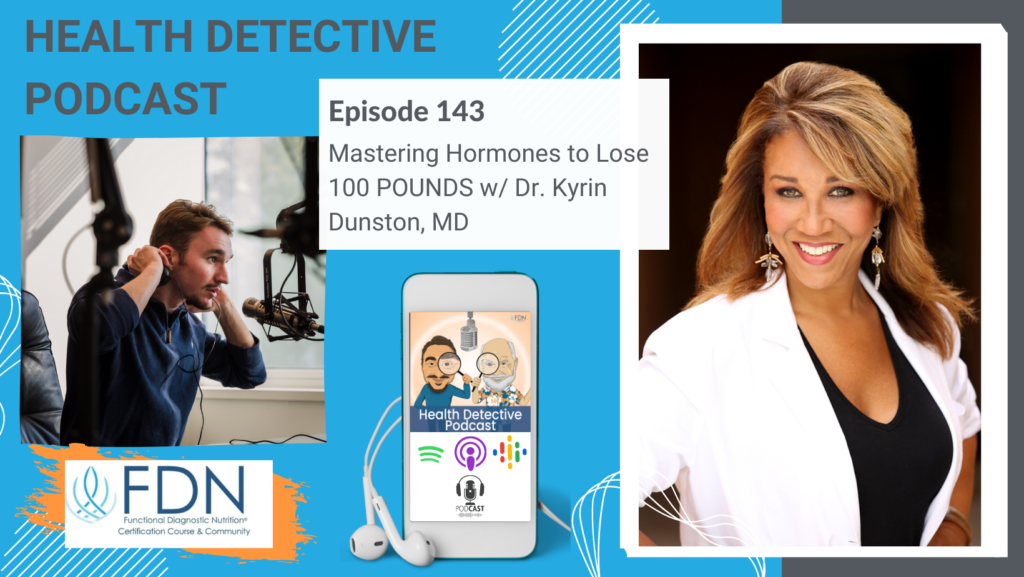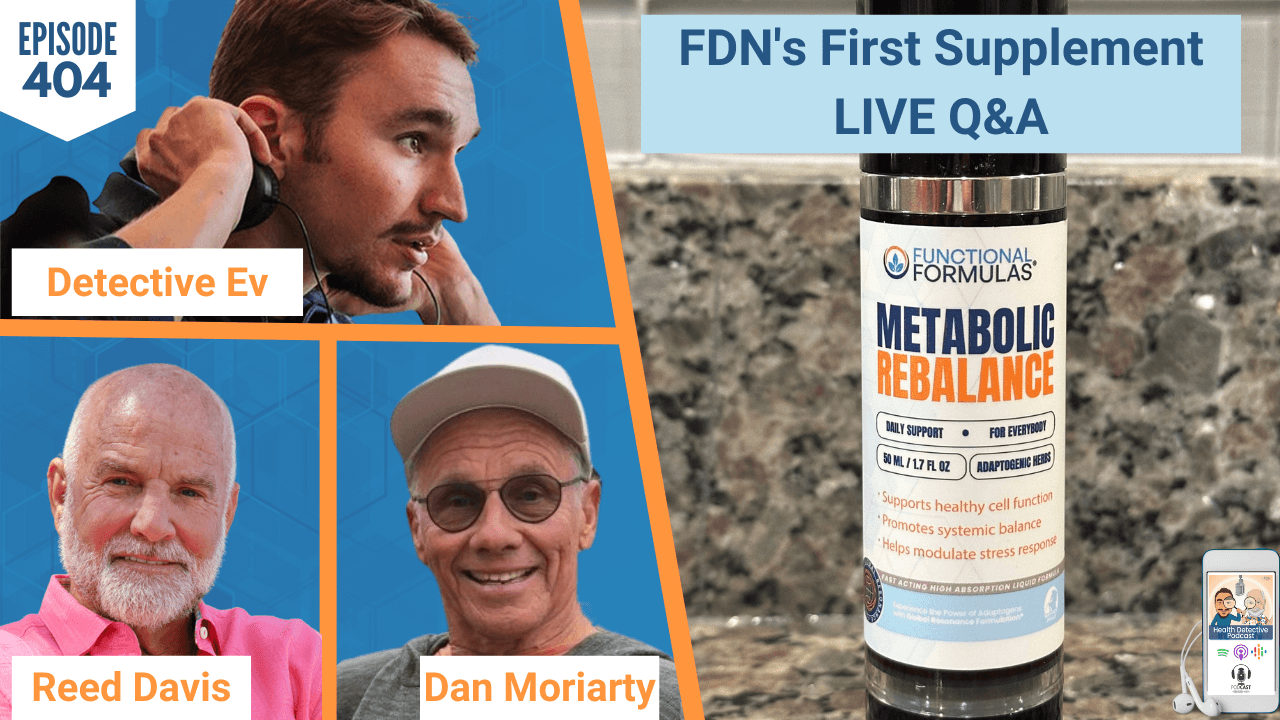Introduction
[00:00:00] Detective Ev: Well, hello, my friends. Welcome back to another episode of the Health Detective Podcast by Functional Diagnostic Nutrition. My name is Evan Transue, AKA Detective Ev. I will be your host for today’s show with Dr. Kyrin Duston on mastering hormones.
I must say I loved this conversation. First of all, I loved her story, but second of all, just the passion that she brings to this. It’s something that I see relatively often in the space. But I love when people just let it flow and come out verbally. Passion is something that I believe cannot be taught.
It’s not something you’re necessarily born with. It’s something that comes to us through experiences that we have in our life, or even through greater callings. I do believe that. It is so obvious that Dr. Kyrin Dunston, in my opinion, was supposed to have the things happen to her that did happen to her because now she’s doing incredible work.
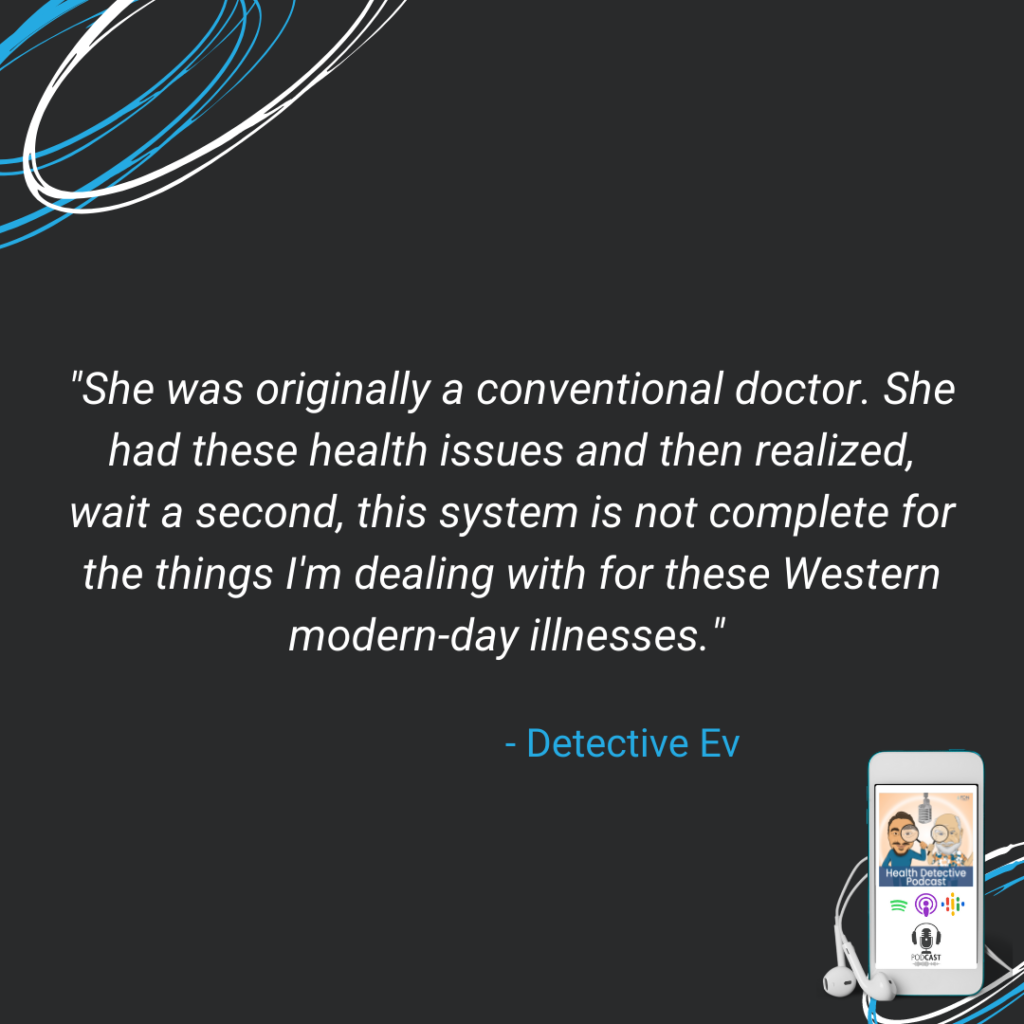
She was originally a conventional doctor. She had these health issues and then realized, wait a second, this system is not complete for the things I’m dealing with for these Western modern-day illnesses. She had to go back to the drawing board. She had to go back and see, what did I miss? What do I need to learn now? What do I need to unlearn and relearn to figure out these health challenges that I have?
So, I’m going to give her bio, it’s pretty impressive. Then we’re going to jump right into the episode. We do a really good job of uncovering and unpacking all of her story within this. But then we also talk about the many things going wrong in kind of like the world of Western medicine.
About Dr. Kyrin Dunston
After discovering the hidden cause of midlife weight gain and fatigue in women, OB/GYN, Dr. Kyrin Dunston, lost a life-changing 100 pounds and fixed her adrenal fatigue. That is 100 my friends. She is fellowship trained in anti-aging metabolic and functional medicine and has practiced this exclusively for over a decade.
A pioneer of female hormonal justice, Dr. Kyrin hosts the Hormone Prescription podcast with new episodes weekly. She is the founder of the Hormone Club an end-to-end all-inclusive membership providing women access to state-of-the-art natural hormone therapy treatment throughout the U.S., and the Midlife Metabolism Institute, providing educational and coaching programs for women at midlife to fix their hormones, their metabolism, and their health.
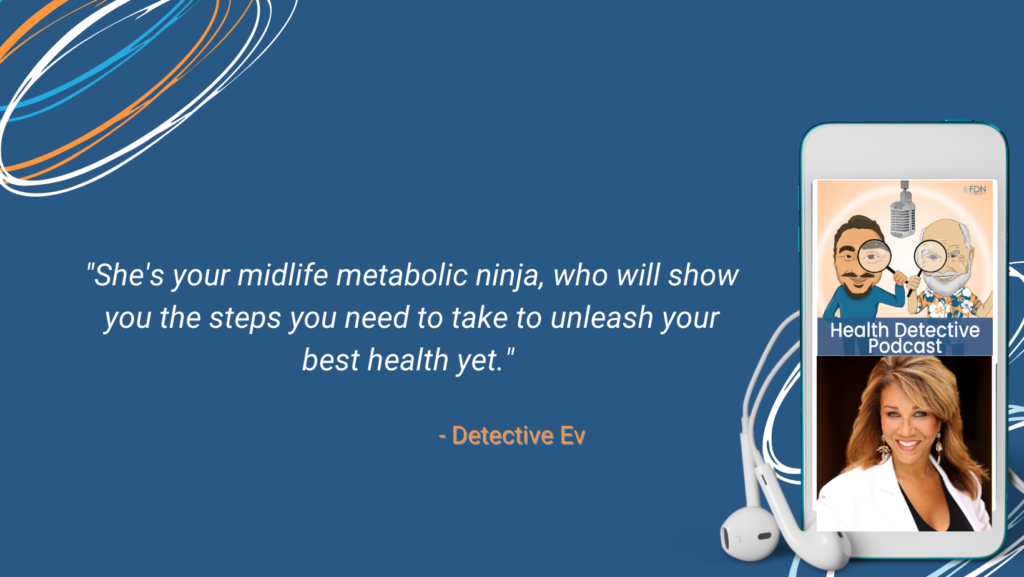
Dr. Kyrin has been featured on CBS, NBC, Reader’s Digest, The Huffington Post, First for Women, Best Self & More. She’s your midlife metabolic ninja, who will show you the steps you need to take to unleash your best health yet.
Well, if that doesn’t get you excited, I don’t know what does. Without further ado, let’s get to the episode. Hello there, Dr. Kyrin. Thanks so much for being here with us today.
Before Mastering Hormones – The Gradual Symptom Pileup
[00:02:41] Dr. Kyrin Dunston: Thank you for having me. I’m super excited to be here.
[00:02:44] Detective Ev: I’m excited too. Your bio is crazy cool. So, I’m very interested in diving into that story and the things that you overcame.
I want to jump into this the same way that we do in any other podcast. I want to know when did the health symptoms start for you and what did they look like? I know there’s this huge thing with a hundred-pound weight loss. We’ll definitely touch on that. But what was some of the first stuff that was going on for you? And what did that look like?
[00:03:09] Dr. Kyrin Dunston: I’d say the first thing was my period started being irregular and heavy. My mood started just being low and I was irritable for no reason. I’d say those were really the first two things.
But you know, it’s so funny. I always say that, how do you eat an elephant? One bite at a time, right? How do you boil a frog? You put it in cold water and then you turn the heat up slowly. Before it knows that it’s getting boiled, it can’t jump out. It’s kind of like that with us women at midlife. These symptoms happen so gradually and early, we discount them, and we attribute them to other things that before it’s too late, like for me, I weighed 240.

All I had energy to do was sleep and work. I was on five medications for depression and anxiety. I had fibromyalgia; my body hurt all over. I’d say all of these things just started gradually.
[00:04:04] Detective Ev: Just to be clear, what’s fascinating to me is you’re a doctor while all this is happening, correct?
Before Mastering Hormones – Stuck in the System
[00:04:08] Dr. Kyrin Dunston: Right. I’m board-certified OB/GYN now. I was then. I don’t practice it anymore.
I’d say, oh, well I must have a thyroid problem cause I’m cold all the time, my hair’s falling out, I don’t poop every day, I’m gaining weight, and I’m tired. Right? Hallmark symptoms of thyroid. So, I would draw blood and I’d do a thyroid profile and it would come back, quote/unquote “normal”.
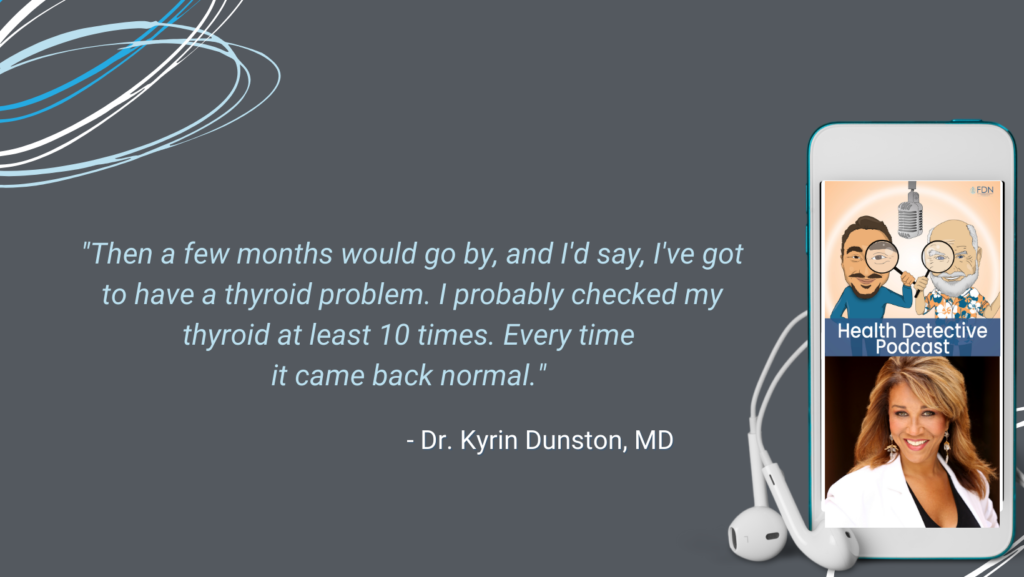
I’d say, okay, I guess I don’t have a thyroid problem. I attributed it to, I didn’t work out enough and I ate too much, but I really didn’t. Then a few months would go by, and I’d say, I’ve got to have a thyroid problem. I probably checked my thyroid at least 10 times. Every time it came back normal.
So, yeah, OB/GYN.
[00:04:48] Detective Ev: Well, and the reason I asked is because we’ve had many doctors on. I’ve actually had another OB/GYN, maybe two at this point. It’s the same kind of thing. You guys are obviously very intelligent, very educated, and you’re still stuck in the same system that all of us are stuck in. It’s not allowing these people to escape this.
There’s fundamental things that are not being addressed for the chronic disease stuff. I mean, we’re obviously not dogmatic on here. Western medicine saves lives. I was just interviewing someone earlier this week where it literally saved their life. But how that problem that needed lifesaving intervention even manifested was due to the things that we’re doing in our modern world that no one talks about.
Before Mastering Hormones – Being the Top in Women’s Health
I think we need to mix both of these together and try to find that nice equilibrium.
You had said you’re kind of contributing to other things, right? Well, maybe I’m eating bad, or maybe I’m not exercising enough. Knowing in the back of your head, maybe that’s not accurate. But it’s very easy to get caught up in our day-to-day life.
I know how busy I am. I can only imagine how busy it gets for someone like yourself, especially in that position then. There’s many things going on that it kind of is easy to ignore, I guess, in a sense. I mean, 10 times you check the thyroid, at what point do you start wondering, wait a second, maybe something isn’t adding up here? Maybe some of the stuff that I’ve been taught doesn’t necessarily apply to what I’m dealing with. Because that’s gotta be hard to break that paradigm.
[00:06:02] Dr. Kyrin Dunston: You know, what’s the definition of insanity? Doing the same thing over and over again, expecting different results. But I went to medical school because I knew I wanted to work with women. I wanted to help them. I said, okay, what’s going to give me the biggest, best toolbox in order to do that? Oh, I’m going to go get my MD.

So, I did. It never occurred to me that there was something that I didn’t know about women’s health. I went through my training. I became board certified. The certifying board of American College of Obstetricians and Gynecologists said, Kyrin Dunston, you know more about women’s health than anybody else.
Before Mastering Hormones – Taking on Blame
I got that certification and I’m like, I know all about women’s health and hormones, nothing else to know. So, literally when I would do my thyroid, I think I internalized it. I call it a form of gaslighting that happens, where I was like, there’s something wrong with me. It’s my fault. There’s something wrong with me. I’m not fixable.
I talk to women every day who think the same thing, Evan. They’re like, I’m not fixable. I’ve been to every doctor. I’ve had every test. I’m like, no, no, no, sweetheart, you haven’t. You’ve just been in a medical system.
You know, I’ve heard that when Columbus first came to America, that the native peoples had small boats. They knew what those looked like. But they didn’t know in their belief system and wisdom there was never a giant ship with multiple sales that was several hundred feet long. Because they had no experience with this, they didn’t see the big boats.
The question is, why didn’t you run? Or why didn’t you get ready to attack? What I learned it’s because they had no paradigm for these big boats. It’s exactly the same with what’s happening with us in medicine.
Because we are socialized to believe that MD is the holy grail, our medical system is the holy grail – best medical system in the world. That anything it doesn’t cover, doesn’t exist. Therefore, the people who go there for care, yes.
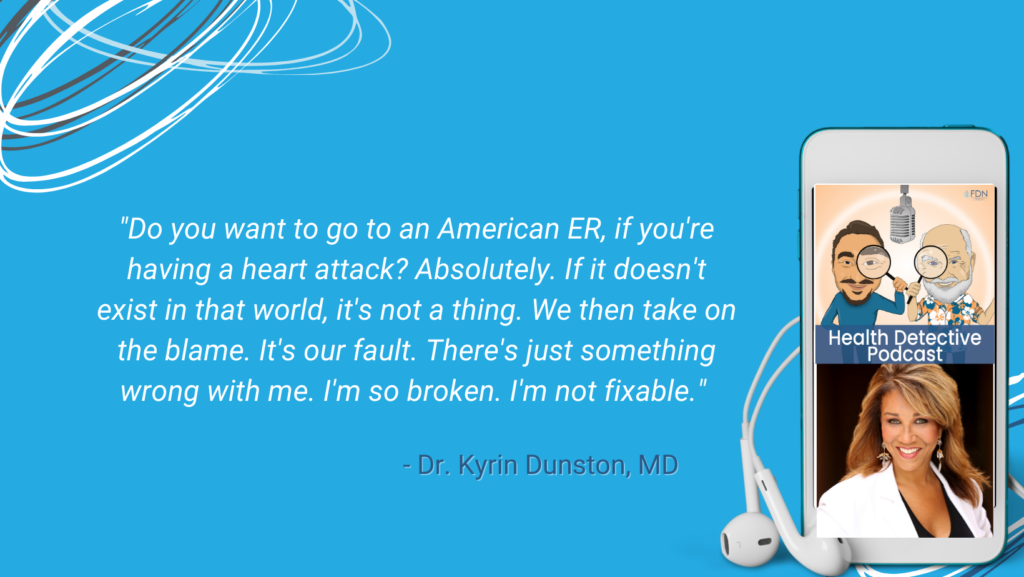
Do we need it? Yes. Do you want to go to an American ER, if you’re having a heart attack? Absolutely. If it doesn’t exist in that world, it’s not a thing. We then take on the blame. It’s our fault. There’s just something wrong with me. I’m so broken. I’m not fixable.
Before Mastering Hormones – Going Back to School
This is particularly true for women because our hormones are changing all the time, right? Men only cycle with a diurnal variation day and night, right? Melatonin, serotonin. Well, we’ve got that cycle and then we’ve got our 28-day moon cycle. Our estrogen is always changing. Our progesterone is always changing. Our testosterone is always changing.

There’s so much that can go wrong there. Basically, mainstream medicine doesn’t have answers for this. So, we are gaslit and made to believe that it’s our fault. It’s not our fault. So, I had to go back to school to get a bigger toolbox and get the paradigm.
That’s what I did so I could fix myself and help other women.
[00:09:11] Detective Ev: Wow. This is really interesting hearing this from a doctor’s perspective that you kind of fall into that same trap.
For myself, this is actually a part of my story. I talk about mental health stuff a lot. One of the things that I explain is my parents actually did take me to the doctor at five years old. I was already dealing with panic attacks. Now this was a good guy, but it’s an imperfect system. Not to mention I’m 26. So even 21 years ago, I think there’s just been a very large shift around stigma of mental health. I don’t think it was him judging it. I just don’t think a doctor was looking at a five-year-old coming in with two parents that were happy people, and thinking that, oh, this kid must be having panic attacks.
Believing the Doctors and Shutting Our Mouths
The thing is though, even kids are doing what you’re talking about. I didn’t talk about this stuff voluntarily (even though I dealt with mental health issues up until 20), I didn’t voluntarily talk about this for another 13 years. Because in my head, I never forgot at five years old, him being in that office with myself and my parents saying this is not something to worry about.
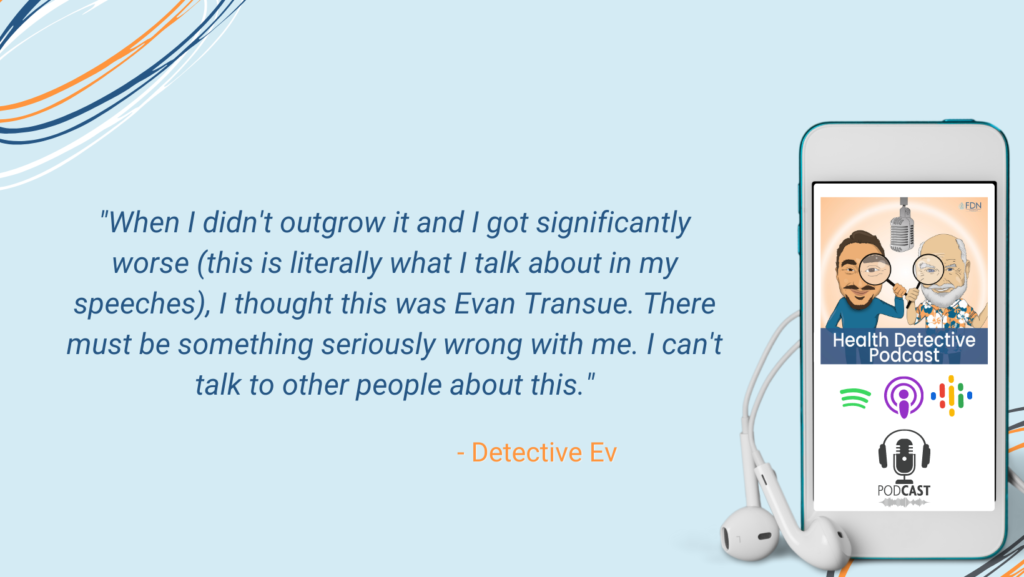
Evan gets himself too worked up and he’s going to outgrow it. When I didn’t outgrow it and I got significantly worse (this is literally what I talk about in my speeches), I thought this was Evan Transue. There must be something seriously wrong with me. I can’t talk to other people about this. Of course, those presentations are more for like the stigma around mental health. But it applies to actually getting help with a variety of issues.
We’re blaming ourselves because in many ways doctors are the pinnacle. Clearly some of the most intelligent people, financially well-off. They are the pinnacle of society, but we forget that they are still humans. And amongst those humans, even at the highest level, are still imperfections, guys.
Like we got plenty to learn. It’s one thing when someone like me that didn’t have a bias either way, figures this out and goes into the functional stuff. I got a huge respect for people like yourself and the other doctors that we’ve had on, that can challenge that paradigm when they’ve realized it’s not working in the way that it’s supposed to.
Why-Medicine vs. What-Medicine
Now they have a wonderful toolkit to apply to either patients or whatever else they end up going and doing. I think you guys are some of the most credible and helpful people in this space. You can say, hey, look, I did this over here, but I also needed some of this. Here’s how we can be realistic and meet in the middle.
So, you said you went back to school for this. What did that entail? Like what did that look like to start learning about maybe more natural stuff? I’m not sure.

[00:11:16] Dr. Kyrin Dunston: I went to the American Academy of Anti-Aging Medicine and did a fellowship in anti-aging metabolic and functional medicine. Which is basically, instead of the what-medicine of mainstream medicine, which is, what is the diagnosis? What drug do I give? What surgery do I do to control the symptom? It’s why-medicine. Why did Evan have panic attacks at five years old? Why did I weigh 243 pounds and have chronic fatigue, fibromyalgia, depression, anxiety, the whole list, when I was 47?
Looking at Leaves & Branches or Looking at Roots?
It’s like the difference, if you look at health like a tree. Mainstream medicine is up in the leaves and branches. The neurologist is over on one branch. You go there if you have migraines, and they clip a few leaves. If you have crazy periods, you go to the gynecologist on another branch, and they do something over there, right? All the branches are separate, nobody’s talking. You end up with a very misshapen tree with clipped leaves and branches.
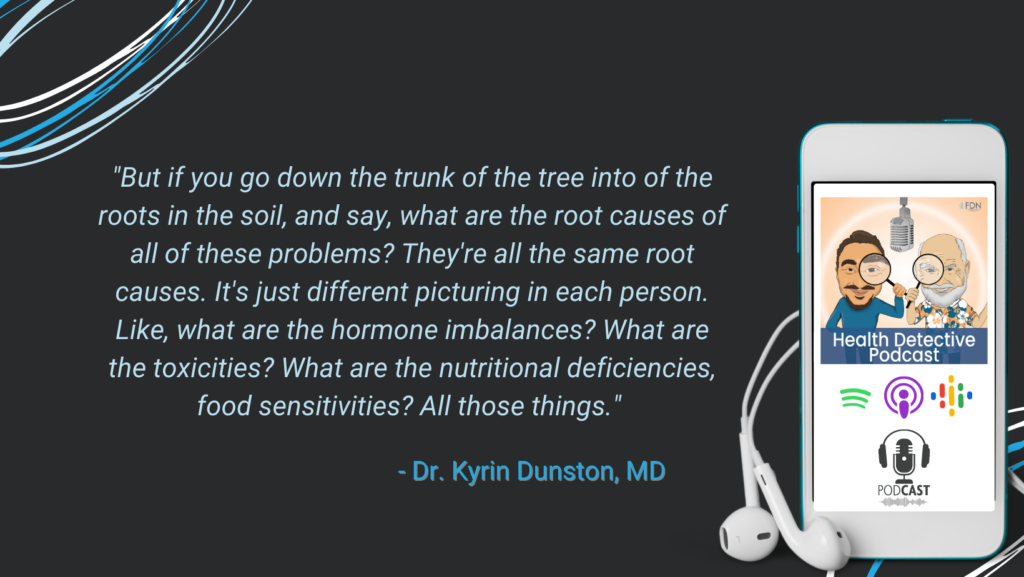
But if you go down the trunk of the tree into of the roots in the soil, and say, what are the root causes of all of these problems? They’re all the same root causes. It’s just different picturing in each person. Like, what are the hormone imbalances? What are the toxicities? What are the nutritional deficiencies, food sensitivities? All those things. You fix that, then all the leaves and branches improve. Not because you gave a drug or did a surgery to control the symptom, but because you fix the reason why people had the symptom in the first place.
That’s what I went back to school for. It transformed my health, and life, and my career. It transformed the health of thousands of women I’ve had the pleasure to work with since then.
[00:12:57] Detective Ev: I’m excited to hear more about this story. There’s one thing I got to ask though, because I’ve never felt it to be so relevant as right now in 140 something episodes.
You Can’t Convince an MD
How can I explain this as a lay person intelligent enough, but no genius and not a doctor, not credentialed in that sense? How could I explain to a doctor what you just explained to me so that we can understand both worlds? Because I’m always, just to be clear, promoting to the natural people that we need to shut up.
Like they will be so anti-medicine sometimes, not FDNs thankfully, a lot of natural people. I’m like guys, the minute you break your arm, you’re going to the ER, so shut up. Like something’s going to happen. I can convince them easy enough cause I’m in that space.
But how do I talk to a doctor and make them realize that there’s a whole other side to this? When they have all these credentials, they are intelligent, and it’s worked for them in many ways, probably, what can we say?
[00:13:44] Dr. Kyrin Dunston: There’s nothing you can say. Nothing. That’s the reality of it. Right?

Everybody wants to become an evangelist when they see the light. Nobody wants to be preached to, nobody wants to be told they don’t already know the truth. Particularly not people who are highly intelligent pillars of society who spent several hundred thousand dollars and years of their life going through very rigorous, somewhat torturous training, who have staked their whole lives.
You know, once you get that MD (there’s some of us who like to joke that we say MD stands for minor deity), and you get that board certification, you’re told that you know more about this subject and this type of help than anyone else in the world if you’re in the American medical system.
Before Mastering Hormones – Having No Answers
You have something that I call contempt prior to investigation. If there’s something that comes across your path and you don’t know about it, it’s quackery and you don’t even want to hear anything else about it.
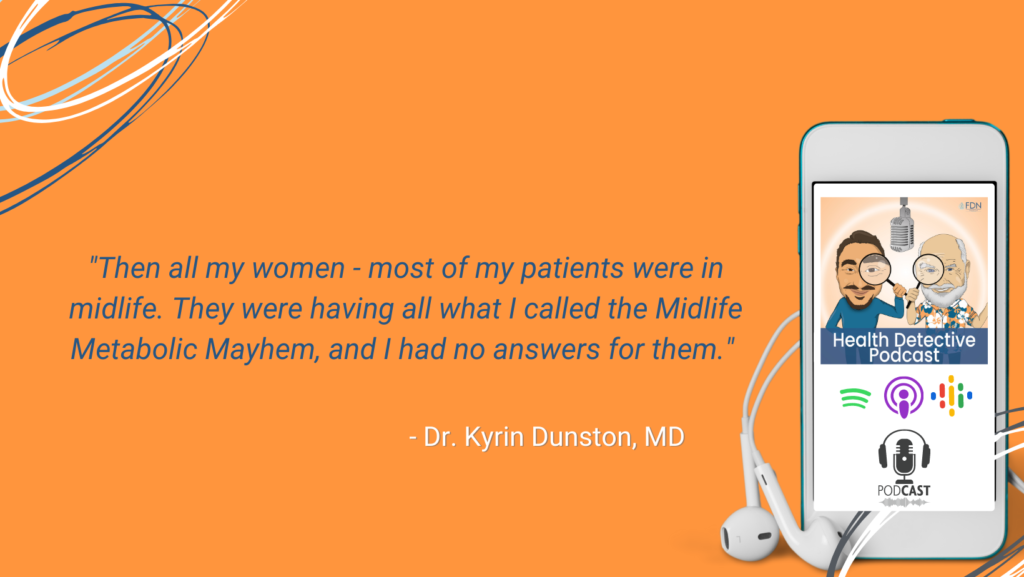
In fact, Evan, when I finally discovered, it was a patient. I was 47. Then all my women – most of my patients were in midlife. They were having all what I called the Midlife Metabolic Mayhem, and I had no answers for them. So, I would give them birth control pills, sleeping pills, anti-depressants, and all the things, cause that’s what I was taught.
Well, this one woman went away. I didn’t see her for a year. Then she came back, and I saw her at the end of the hall. I was like, oh my gosh, she lost all the weight. Her hair’s full and her eyes are bright. She’s smiling. There’s a pep in her step. So, I couldn’t wait to get her into the exam room and find out what she did.
She said, well, Kyrin, I went and saw this doctor in another town who did these tests on my hormones, you never did. She balanced my hormones naturally, which you never talked to me about. It changed everything and everything with my health reversed. She was clearly a walking billboard, and I was in so much pain at that point.
Before Mastering Hormones – Facing the Unbeatable Paradigm
Pain will push you until your vision pulls you. My pain was so great, if someone had come and said, Kyrin, I’m the answer to your problem. You need to eat a cup of dirt a day. I would have done it.
So, I saw her. She was a walking billboard, and no more could I discount what I saw and what she said to me. It was very humbling. I set out to research what she had done. That’s when I discovered, oh my God, there’s this whole world I don’t even know about.
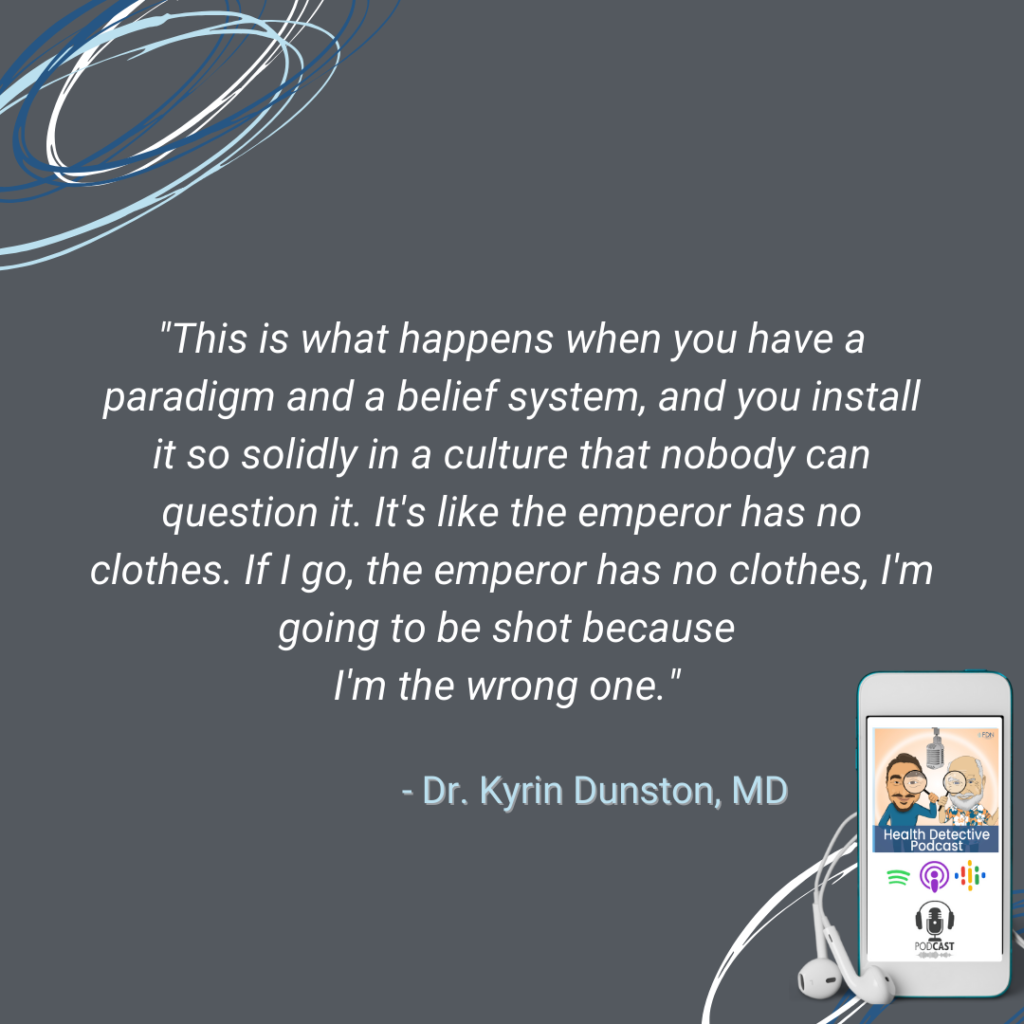
But if I’m truthful, about 10 years before, there was a doctor in our community who practiced this way. Do you know that I never looked into the validity of what he did? We used to laugh about him in the doctor’s lounge and call him a quack. This is what happens when you have a paradigm and a belief system, and you install it so solidly in a culture that nobody can question it. It’s like the emperor has no clothes. If I go, the emperor has no clothes, I’m going to be shot because I’m the wrong one.
Our medical system is part of big insurance, big pharma, big food, big medicine. It is a conglomerate. And if you go against that, that’s a whole other thing. But nobody’s going to believe you. So, there’s nothing you say to your doctor, who has the MD degree to make him see the light. It’s not going to happen.
Let the MDs Find the Light Themselves
The people who practice the way I do, are doctors (and there are tens of thousands of us now, globally), doctors who had health problems like I did, who had so much pain, who started to say, we must be missing something that I could be suffering this much. Or they have a family member who had that.
I have a friend and colleague in a neighboring town who has a cousin who had a severe blood disorder and was going to die. They gave him no hope in mainstream medicine. He said, this can’t be. We’re missing something. He went on this journey too, and he found it too. Now he practices that way.
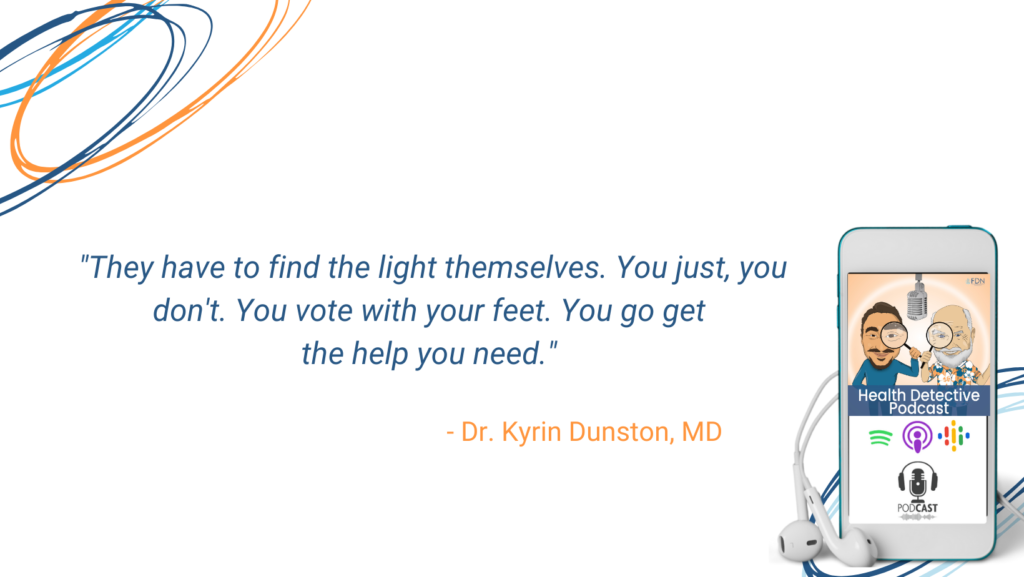
They have to find the light themselves. You just, you don’t. You vote with your feet. You go get the help you need. You just say no. You still go to those doctors, and you get your pap smears and your mammograms and the things you need, your fecal occult blood and your colonoscopies. You need that.
You just go and get the help you need.
[00:18:08] Detective Ev: Ironically, what you just said might be a great testimonial if I can get him to listen to that five minutes, because that was just passionate. But I think that’s easier said than done. I’m going to take your advice.
And I mean, it was crazy. I went to a family practice that had several doctors that would rotate. It wasn’t so much like a revolving door, but there was new doctors every now and then. I remember when I discovered this stuff and it was working so well for me, I started putting the dots together that, crap, I don’t think they needed to remove my mom’s thyroid.
MDs are Stuck in the System Too
I remembered how pissed off I was, because I knew how much hell she went through with all the things that she had. I made the huge mistake. I was 18. I made the huge mistake of thinking that these people were sitting on the fountain of youth and hiding this from my mom. So ignorantly, because I’ve never even paid attention to the health status of these doctors really, I go down to the office.
I set up a whole appointment. I mean, literally I have references with me to start shouting out to these doctors. I’m like, I know that they’re going to get me. These guys are smart. I got to have something here. I wasn’t going in to be a jacka**, but I was going in to make a point for sure.
I remember this guy comes in, I will not mention the name, obviously. He was a guy I had not had before. Without exaggeration, Dr. Kyrin, he was probably 200 to 250 pounds overweight, pale as could be, looked stressed, looked like heck. I had this completely humbling moment where I realized, well, if he’s sitting on the fountain of youth, he’s doing a pretty bad job. Like he must not be using it or something.
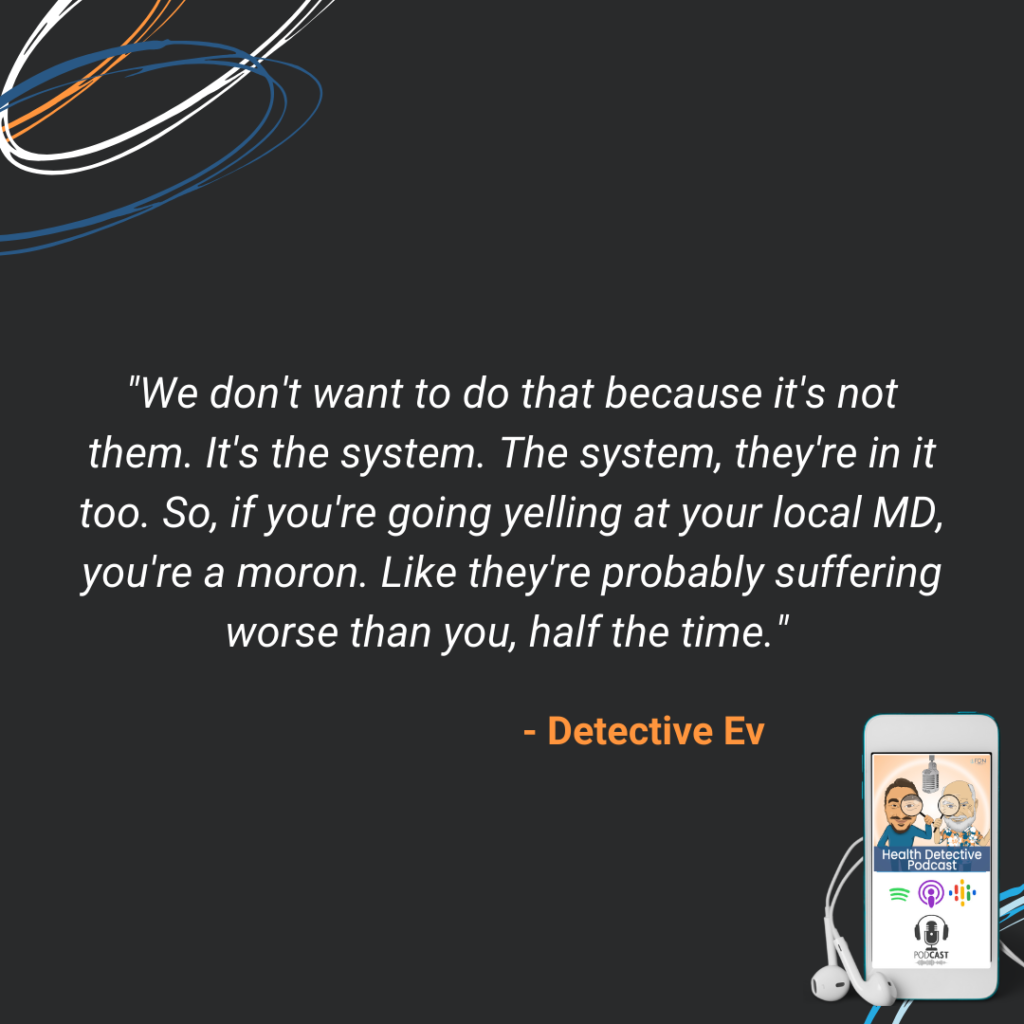
It was actually scary in a sense. Because it’s easy to blame the doctors as so many of our natural friends do. I’m calling you guys out. We don’t want to do that because it’s not them. It’s the system. The system, they’re in it too. So, if you’re going yelling at your local MD, you’re a moron. Like they’re probably suffering worse than you, half the time. They have a stressful job.
Mastering Hormones with the Right Measuring Stick
I think we need to open our minds a little more. We need to realize what’s actually going on and why this happens. It’s an education thing. We can just educate better and kind of have a beautiful synergy on both sides. So, I digress. But with that said, I want to hear about your health journey more, then obviously what you do for people.
You said you got into why-medicine. You’ve mentioned multiple things that I’ve loved the way that you phrase them. But why-medicine. What was the “why” for you? What was going on that led to an eventual hundred-pound weight loss once you discovered this?
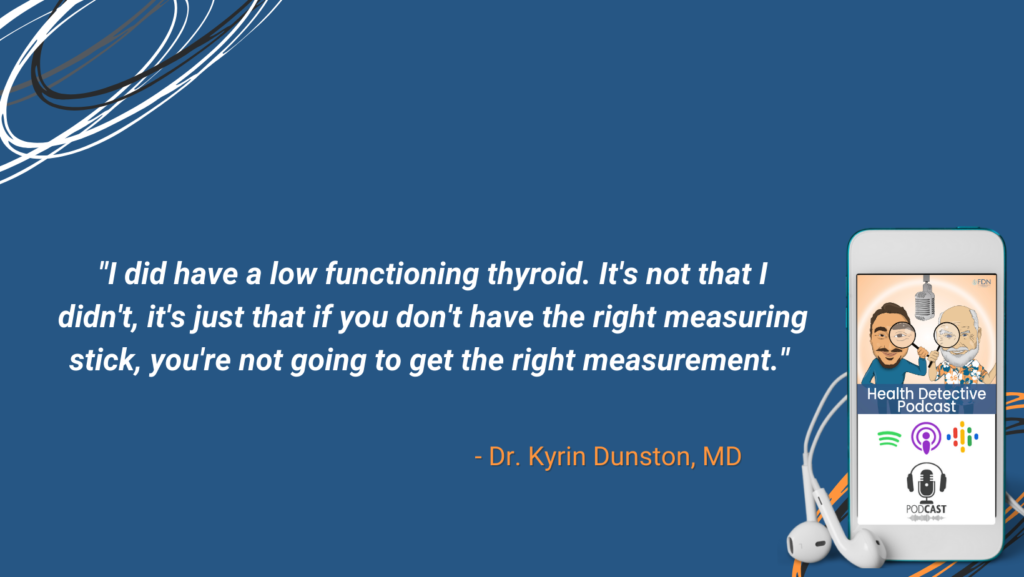
[00:20:19] Dr. Kyrin Dunston: The first thing I did was when I did the right thyroid tests and I read them the right way, I did have a low functioning thyroid. It’s not that I didn’t, it’s just that if you don’t have the right measuring stick, you’re not going to get the right measurement. So, I wasn’t doing the right tests, but I didn’t know that.
When I did the right test, I did have low thyroid. I addressed that. Then the other, one of the first things I found on that first go round was that I had low progesterone, which is pretty typical for women in their forties and perimenopause, and high estrogen. I started addressing those and, oh my gosh, my energy started to improve. I started losing weight. I thought it was miraculous, but now it’s an everyday miracle.
Mastering Hormones – Addressing Cortisol
This is the kind of thing I see with women all the time. They’re so afraid when I do the test that I’m not going to find anything because they’ve been to so many doctors and been told there’s nothing wrong. They’re all biting their fingernails. What if she says there’s nothing wrong? I said, I promise you if you have symptoms and you don’t feel a hundred percent, there’s a reason why. If you don’t know the reason why, you haven’t done the right test, you haven’t asked the right question. I promise you; we will find problems.

That was me. I did the right tests and then it was that. Then after that I was hooked. I joined the fellowship program. Then I discovered when I did salivary cortisol, I had a flat line cortisol, which some people listening might not know what that means. But I had the worst kind of adrenal fatigue you can have.
Your adrenals make your cortisol, it’s your stress hormone. You can’t live without it. In other words, I had enough cortisol that I was alive and breathing but that’s all I had. I didn’t have enough cortisol to fund anything else. It’s no wonder that I dragged my butt all through the day and couldn’t wait to get home and go to bed.
Mastering Hormones, Toxins, & Gut Dysfunction
Even though I was a wife and a mom, I literally would walk in the door, and I’d be in my pajamas and in the bed within five minutes. That was my next thing. So, it was all about hormones. For me, that’s where I start with women foundationally. That’s the communication in your body. You got to get that right.
Then it was going into the toxicity. I didn’t know that was a thing. I was taught in my medical school training, oh, your body takes care of the detox. You don’t need to do anything. Patients would ask me; do I need to do a detox? I heard that I need that. I would tell them, oh no, your body takes care of it.
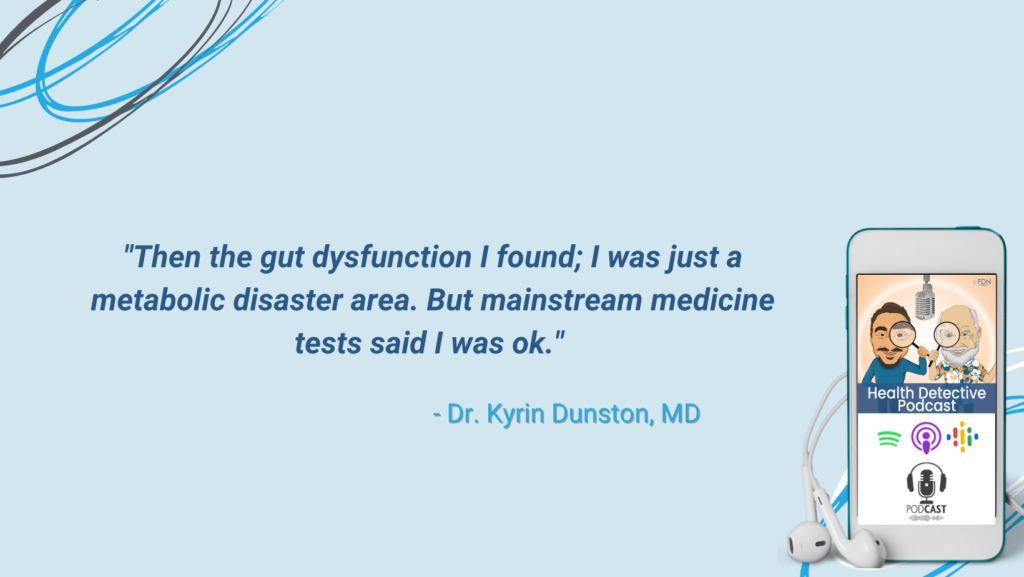
Then when I went to my fellowship, I learned that is not true at all. In fact, you got decades of crap that you need to work very diligently to get out of your body. So, I started working on that. Then the gut dysfunction I found; I was just a metabolic disaster area. But mainstream medicine tests said I was ok.
Commerical Break – Try the FDN Course for FREE
[00:23:03] Detective Ev: Hey, my friends, it is Detective Ev here popping in really quick. I just wanted to say, maybe you’ve had this experience that Dr. Dunston is describing right now. You are being told you’re okay, when you know for a fact, you are certainly not okay. You got to understand the Western system.
Remember Dr. Kyrin Dunston is a conventionally trained OB/GYN. If anyone knows about the system, she does. She’s a realistic figure talking about some really great things over here, and some really great things over there as well (referencing Western and functional medicine respectably).
Sometimes we got to dig a little deeper. Conventional medicine is what-medicine. They’re looking for the diagnosis. What diagnosis is this and what drug can I give accordingly? If they can’t find anything, it probably means there is not a diagnosis. And if there’s not a diagnosis, good luck. You’re going to need someone who is trained in a more functional framework to figure out what is going on with your body.
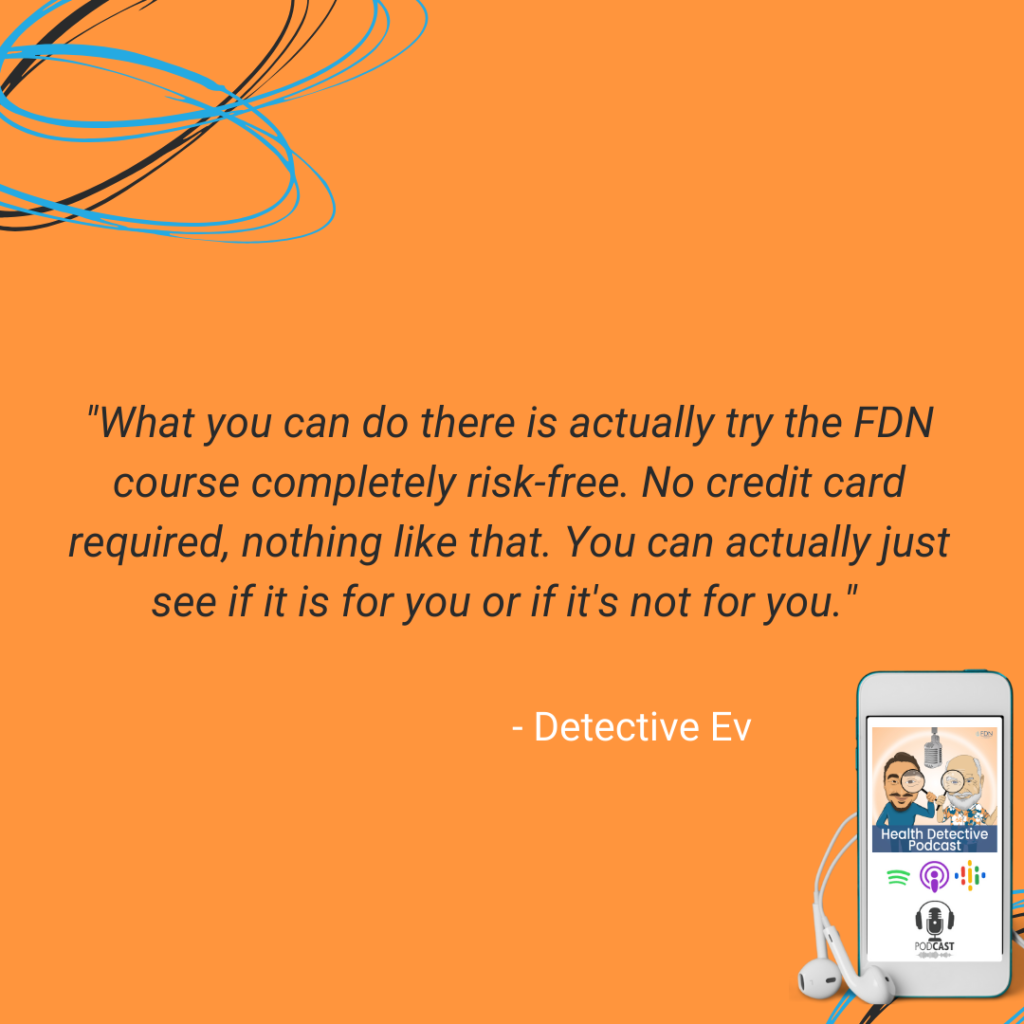
If you want to do that work, then visit fdntraining.com/tryfdn. That’s fdntraining.com/tryfdn. What you can do there is actually try the FDN course completely risk-free. No credit card required, nothing like that. You can actually just see if it is for you or if it’s not for you.
Dr. Kyrin Dunston Prioritizes FDNs
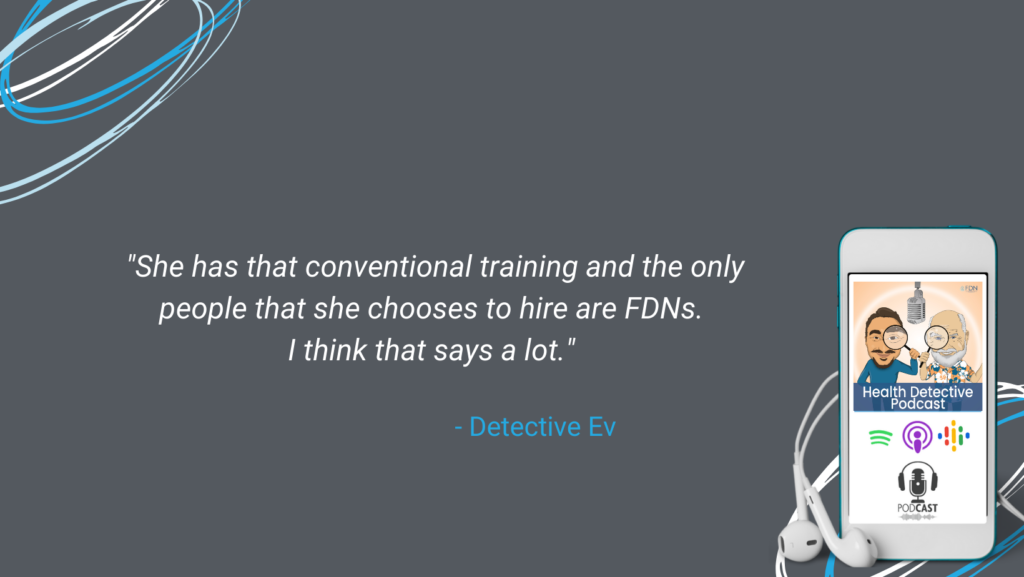
I will say this because I thought this was cool. In our event that we did earlier in May, which Kyrin Dunston was a part of, she said that FDNs are the only types of practitioners that she will hire to work under her as a doctor who is traditionally trained as an OB/GYN. She has that conventional training and the only people that she chooses to hire are FDNs. I think that says a lot.
So, if you want those types of opportunities and if you want to actually figure out why you feel the way that you feel, or your clients feel the way that they feel, then go to fdntraining.com/tryfdn.
All right, I apologize. I know that was a bit of a longer ad spiel. So here we go back to the episode.
There’s two really interesting parts there and I think it actually can be the same question. You mentioned the right type of thyroid tests. We get a wide variety of people that listen to this. Some are practitioners and they know exactly what you mean by that. I have a clear picture. But then others are like, maybe just considering going through the FDN course, or they’re looking for someone to work with such as yourself.
What does it mean when you say, “right tests”? Then again, I don’t want to make it too complicated of a question. I think it’ll go in together. Why isn’t Western medicine looking at this? What makes your test right? Because we need the Western medicine stuff. They look at useful things at certain times. Where is the disconnect here for someone that’s maybe new to this? They’re like, well, isn’t blood testing all the same? Like what are they missing? I don’t get it.
Mastering Hormones with the Right Thyroid Testing
[00:25:37] Dr. Kyrin Dunston: Mainstream tests for thyroid dysfunction are TSH, thyroid stimulating hormone. That’s a hormone that your brain makes to tell your thyroid to function, and, or a thyroid profile, which includes a TSH and a total T4, which is the inactive thyroid hormone that your thyroid makes. It has to be converted into T3 in order for your body to use it. Your body only can use the free fraction of T3, not the total.
So, when you want to know how your thyroid is functioning, you need to know not only what the TSH is, but the free and total T4, free and total T3. You also want to know something called the reverse T3, which could block healthy T3 from sitting on the T3 receptor.
You also want to know does someone have antibodies. Do they have anti-thyroglobulin antibodies? Do they have thyroid peroxidase antibodies? Why? Because you may have perfectly great thyroid function, but if you have antibodies, you’re not going to have very great thyroid function for long. It’s an auto-immune disease that means impending thyroid destruction is going to happen.

And guess what? If you know that early enough, I catch it all the time in women, their thyroid function is fine, but they’ve got antibodies. You can get rid of those antibodies, and they never have to go down the thyroid hypothyroid road.
How Our Medical System Evolved
Mainstream medicine, like I said, is what-medicine. What is the diagnosis? What drug do I need to give? What surgery do I need to do? You know, our medical system really came to maturity in the last decade, around this concept of it’s paid for as an employee or employer benefit.
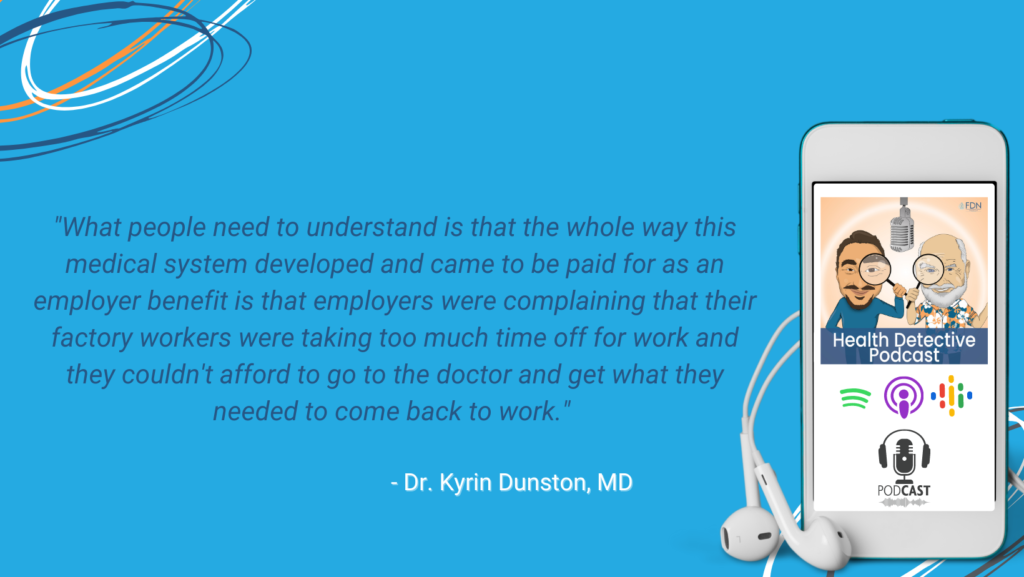
What people need to understand is that the whole way this medical system developed and came to be paid for as an employer benefit is that employers were complaining that their factory workers were taking too much time off for work and they couldn’t afford to go to the doctor and get what they needed to come back to work.
So, the government decided, oh, we got to get the factory workers back to work. We’re going to make employer healthcare so that employees can go and get a band-aid and get back to work. In our capitalist society, the dollar is king, employers are king, and that’s how our whole medical system evolved.
Nobody questions anymore. Should health insurance be a benefit of your job? Like nobody even thinks about why is it that way? But you have to understand that that is the foundation of our modern medical system. They’re not interested in getting you to a hundred and being optimally healthy at a hundred. All they care about is, can you get back to your job as quickly as possible?
They are about what. What is the diagnosis? What drug do I need to give you to stop that symptom from happening? Or what surgery do I need to do to stop that symptom so you can get back to work. They are concerned with; do you have the diagnosis of hypothyroidism or not?
Mastering Hormones by Looking at the Systems’ Function
All they want to do is they set the parameter, oh, if your TSH is over 4.5, 5.5, it depends on the lab, well, then we’re going to say that you have hypothyroid. We’re going to give you a drug, get that symptom gone, and get you back to work. But that doesn’t look at the function of the thyroid. That is “what.” What is the diagnosis?
Your TSH hormone is made in your brain. It is actually on a negative feedback loop with your thyroid. So, it’s a secondary effect of your thyroid. It doesn’t actually tell us how your thyroid is functioning. If you go in your house and you tell your teenager, I want you to have this house clean before I get home. You get home and you walk in the kitchen and there are dirty dishes in the sink. You yell at your teenager, come down here, I thought I told you to clean the house and they go, I did.
You’re looking at a secondary effect. Did you go look at all the rest of the house and make sure that it wasn’t clean? Cause if you go in all the other rooms, actually was vacuumed, and it was cleaned, and all these things were clean. You didn’t ask, did his sister come in there and eat stuff and put dirty dishes in the sink. You see what I’m saying?

Just because you see dishes in the sink doesn’t mean he didn’t do what he was supposed to do. It’s a loose analogy, but it’s a secondary effect. When you practice why-medicine, you’re looking at the function of these systems for your thyroid.
Mastering Hormones by Picking up What Mainstream Medicine Misses
You’re going to do about eight different tests. You’re not only going to do a TSH and a total T4, but you’re going to look at a free T4. You going to look at a total and free T3. You’re going to look at the reverse T3. You’re going to look at a TPO, thyroid peroxidase antibody, and anti-thyroglobulin antibody.
You’re going to look at all these other parameters and say, what is this thyroid gland actually putting out? How much of it is in the free form and how much of it is in the bound form? How much is getting converted into T3? How much is bioavailable and free? How much has been made into reverse T3 that’s sitting on the receptors and blocked? Because if you don’t check that, everything else can look pretty perfect.
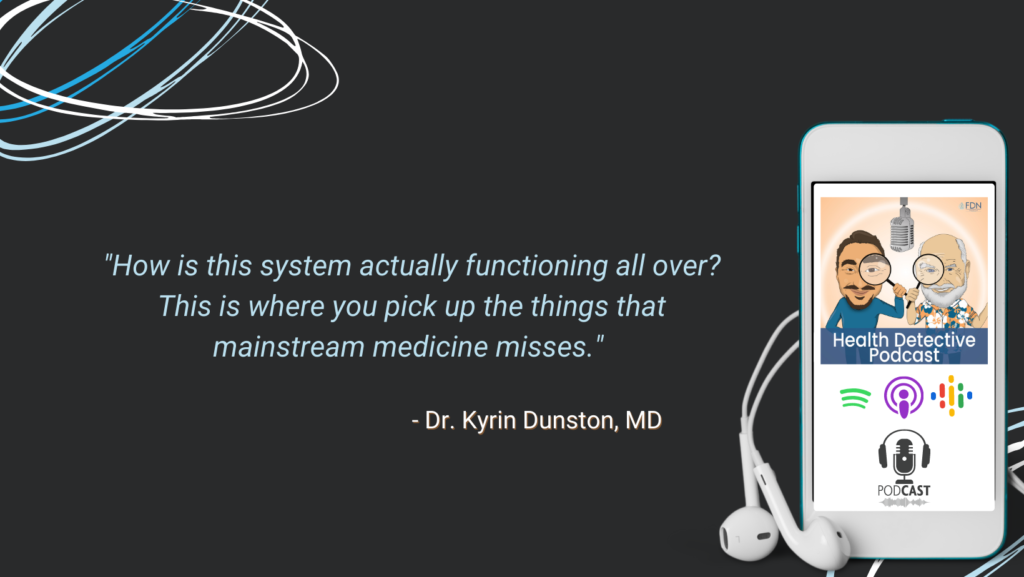
Then if your reverse T3 is really high, none of your thyroid can sit on the receptors because the reverse T3 is blocking it. Then, like I said about the antibodies, “why” looks at the function. How is this system actually functioning all over? This is where you pick up the things that mainstream medicine misses.
You also read the tests the right way. Not only do you have to do the right tests, you have to read them the right way. What do I mean by that? Your doctor is trained, like I was, to use what the lab says is quote/unquote “normal” or “reference range”. You get the lab report. On the left is your value, and on the right is what they say is reference range or normal values. That is defined by what 95% of the population has.
Mastering Hormones by Being Compared to Optimally Healthy People
Remember your bell curve from high school science? If you take any measurement in a population like height, weight, IQ, it’s going to fall under the bell curve. Looks like a bell. If you take the middle 95%, that’s going to be within 2.5 standard deviations of the mean. That’s what’s considered normal for a population. That’s what the lab considers normal for your thyroid. They take American people, they measure all their TSH, free T4, total T4, and they take the middle 95% and they say that’s normal for this population.
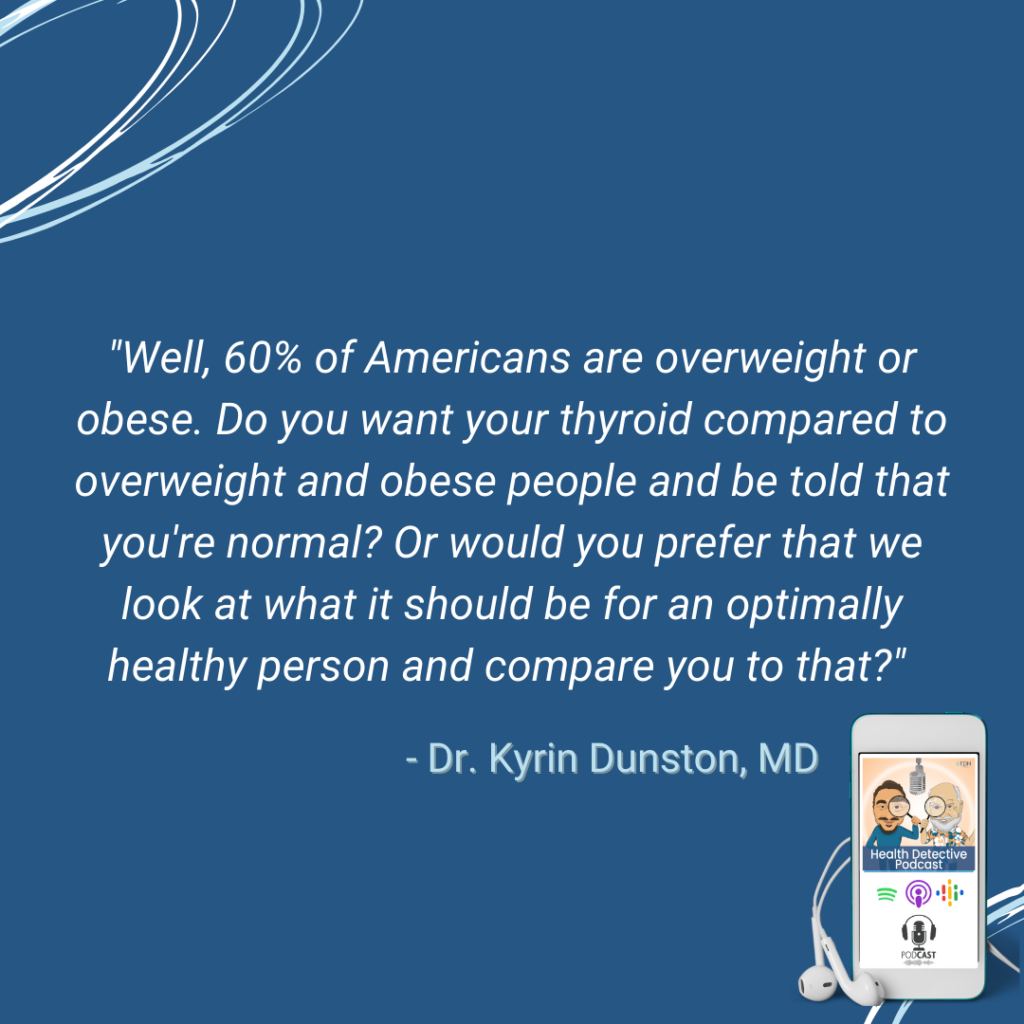
Well, 60% of Americans are overweight or obese. Do you want your thyroid compared to overweight and obese people and be told that you’re normal? Or would you prefer that we look at what it should be for an optimally healthy person and compare you to that? I kept looking at my thyroid and now I know that basically they’re saying, oh, you’re normal for an obese person.
But when I did the right tests, all those tests I mentioned, and I compared it to what it should be for a healthy person, I was clearly hypothyroid. This is the difference. Mainstream medicine is only concerned with what is the diagnosis? Do you have a disease? And comparing you to normal people.
It’s About Minimum Basic Requirements
They’re not trying to get you to be as healthy as you can be. Just like public school is not about, necessarily, (some people might be upset by this, if you are choosing to be offended), it’s not about let’s get everyone into an Ivy League School. It’s like, let’s get people literate. Actually, the educational system was founded with the same employer views in mind.
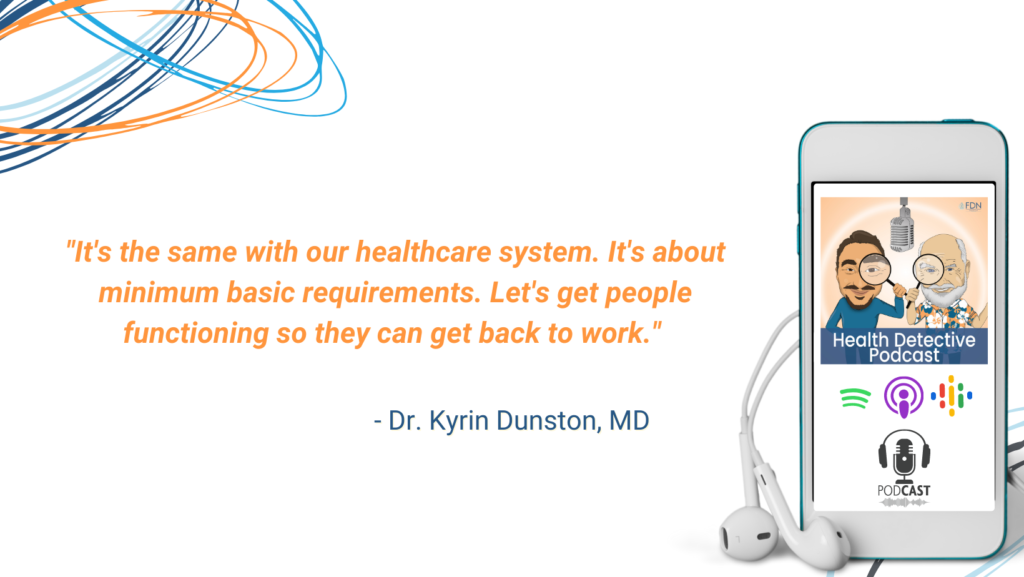
Let’s get them ready for the factory so there’ll be good factory workers. It wasn’t intended to make brilliant thinkers who are going to change the world. It’s the same with our healthcare system. It’s about minimum basic requirements. Let’s get people functioning so they can get back to work.
So, I hope I explained it.
Weeding Out Top Contenders vs. The Bare Minimums
[00:33:49] Detective Ev: Oh my, that was, first of all, just amazing. I love the energy that you’re bringing to this podcast. This is fun listening.
I’m kind of connecting so many dots, not necessarily with the health stuff, but with other systems that we have in this country and other countries, like the military. All right, who can we get in? Cool, now you guys are gonna go do that stuff. Then we get a few exceptional people that we’ll put at the top. Even medicine in a sense.

You gotta be pretty darn smart to kind of get into this, but it’s almost a process of seeing who survives. Because they’re putting you guys through heck to get through medical school and figuring all this stuff. You’re going to work and study like heck. Who can actually make it? Who’s tough enough to do it?
I love studying personality stuff. I mean, there are certain personalities that have some resilience. It’s kind of ironic because you have someone like yourself who was sick, but still pushing through just to go do the job. You’re that type of person that’ll get it done. They weeded you out a while ago, just like they’d weed out the Navy seals or something like that. Just really interesting.
Then comparing that to the factory workers and all this stuff. That’s kind of what it is. How do we get people to just go do the bare minimum of what they need to do, shut up, and that’s that? It’s a little scary, but I think my generation’s aware of these problems. I don’t know if they’re doing a good job at fixing them yet.
Ridiculously High TSH Levels
But anyway, back to the thyroid stuff. I think it’s just important for people to hear this, especially from a doctor. There needs to be other tests going on.
I’ve heard some tremendous TSH levels that actually, that was enough for the doctor, even in a Western sense to help out. Our first guest ever on here, his name’s Ryan Monaghan. He was all the way back in episode number two. He’s one of the clinical advisors at Functional Diagnostic Nutrition now.
When this guy started, he was a musician, felt terrible. His TSH was over 100. I forget what the exact number was, but he said the test didn’t go any higher. Literally it was just like, this is what we test for. I’m not a doctor, I’ve only heard of two people ever that I knew directly having a TSH over 100. I mean, this is ridiculous.
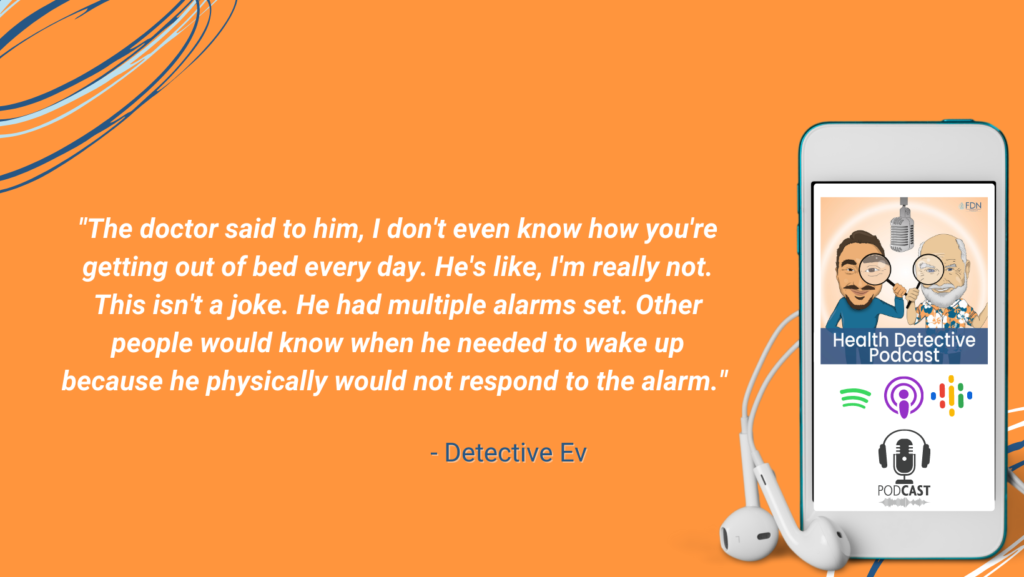
The doctor said to him, I don’t even know how you’re getting out of bed every day. He’s like, I’m really not. This isn’t a joke. He had multiple alarms set. Other people would know when he needed to wake up because he physically would not respond to the alarm. That’s crazy. That’s not normal guys.
Now, thankfully, well, depending on what you’re grateful for, that TSH was so high that they figured that out. But there’s plenty of other people where it’s not figured out. I had actually read something before where the standard of TSH for the longest time was like a 10, no one would consider that good now. Western from my understanding, wouldn’t even look at a TSH at 10 as being normal. It’s like what? 4.5 to 5 is like the higher end of that range.
Don’t Stop at the Diagnosis and Prescription. Ask Why.
[00:36:08] Dr. Kyrin Dunston: Right. Something like that. But can I just add here? I almost say the people who don’t get the thyroid diagnosis are the lucky ones because they keep persisting to find the answers.
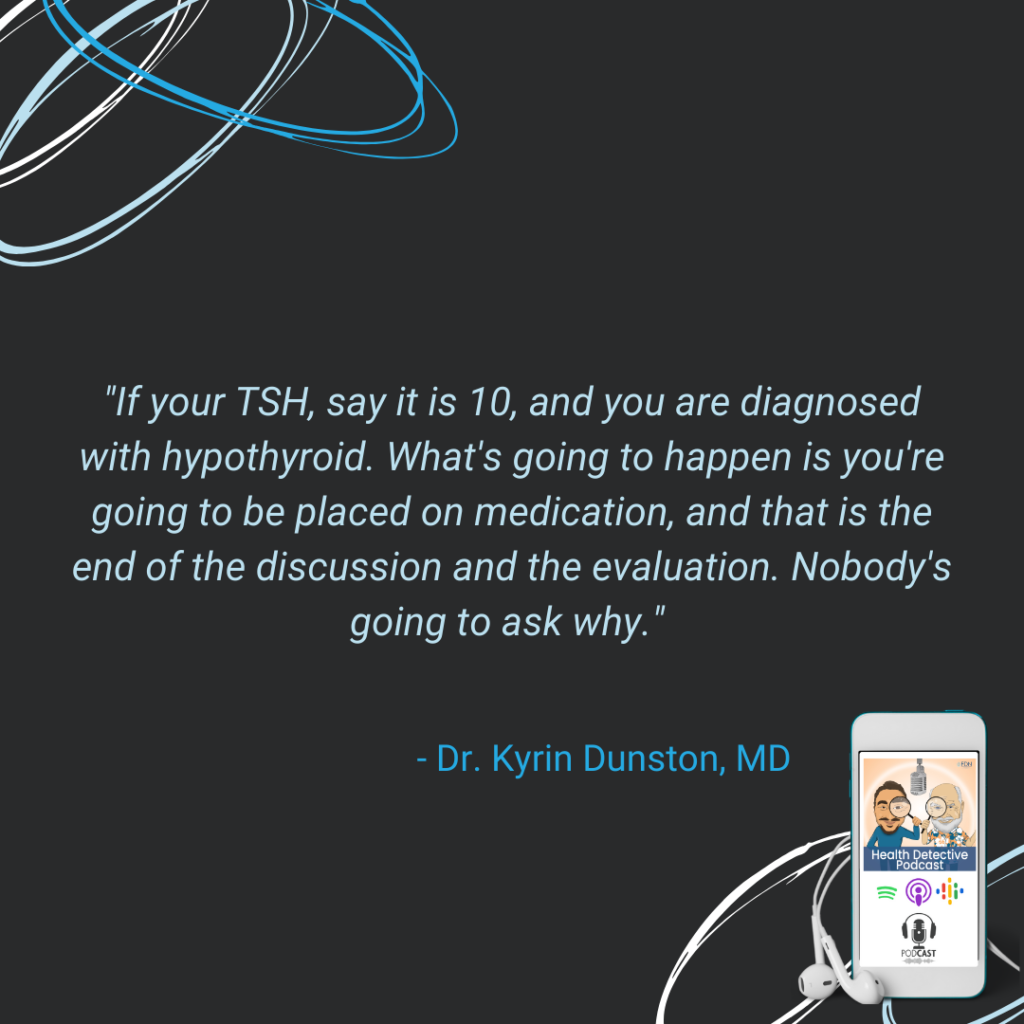
If your TSH, say it is 10, and you are diagnosed with hypothyroid. What’s going to happen is you’re going to be placed on medication, and that is the end of the discussion and the evaluation. Nobody’s going to ask why. They say that once you have a diagnosis, you’re hypothyroid, you just need a prescription. Nobody’s going to ask why, and there are other metabolic derangements.
I like to say that the thyroid is the innocent bystander. She’s just hanging out there and she’s getting beaten up by your cortisol, beaten up by your insulin, and beaten up by your gut. In mainstream medicine, no one’s going to turn those rocks over and look at them. They’re never going to get to the “why” to fix the reason why you have the thyroid problem in the first place.
I love that he was diagnosed and yet there’s more to do.
[00:37:08] Detective Ev: You actually just hit the nail on the head. It was only because that medication changed his life in literally one day he said. He’s like, the next day I woke up with the sun for the first time in probably, I think he said 10 years, or something. However, he kept dealing with symptoms long-term. It didn’t fix everything. That’s what led him to this stuff.
Medications That Work Well Stop the Investigation
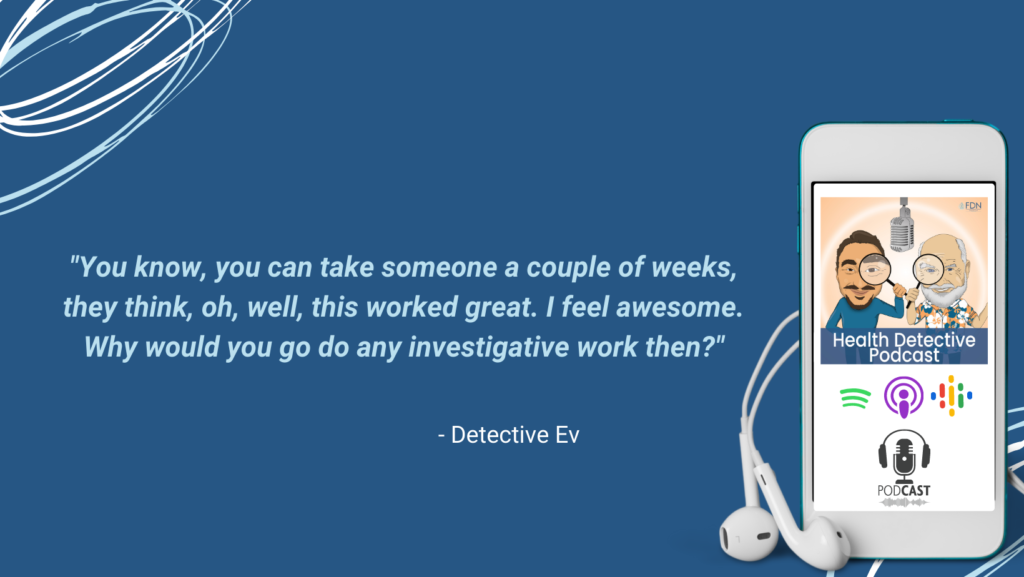
But you’re absolutely right. And I think, especially with family history of thyroid things, the thyroid ones can be some of the most dangerous medications because for certain people, they are so effective so quick. You know, you can take someone a couple of weeks, they think, oh, well, this worked great. I feel awesome. Why would you go do any investigative work then?
But the thing is, the things that’s causing that probably going to happen long-term. I saw this happen with someone who suffered like severe acne at one point, the Accutane conversation. People would take this, now it works a lot less often because our world’s so toxic. But for the longest time it was a last resort drug. Yes, that worked pretty much a hundred percent of the time for most people.
You take it. It’s good to go. Well, why do you have such bad cystic acne that you need isotretinoin, which is a freaking chemotherapy drug originally, for your acne? Have you thought about that? That’s what happened to my mom. She already had these symptoms at 20 something years old. They gave her the Accutane. It worked tremendously, took away the cystic acne. Then 20 years later, she’s diagnosed with graves’ disease. And it took forever to figure out what else was going on. That led to that thyroidectomy. So, I’m glad you brought up the thyroid stuff. I’m very biasedly passionate about that.
But I want to talk about you and your programs too, though. I love where this conversation’s went, but I want to make sure we’re spending the time on that. So, how has this transitioned your career and what do you offer people now?
Mastering Hormones – The Mission that Followed
I know that we already alluded to certain things in the podcast, but I want to hear it explicitly so the people out there that are looking to work with someone, know what you’re doing.
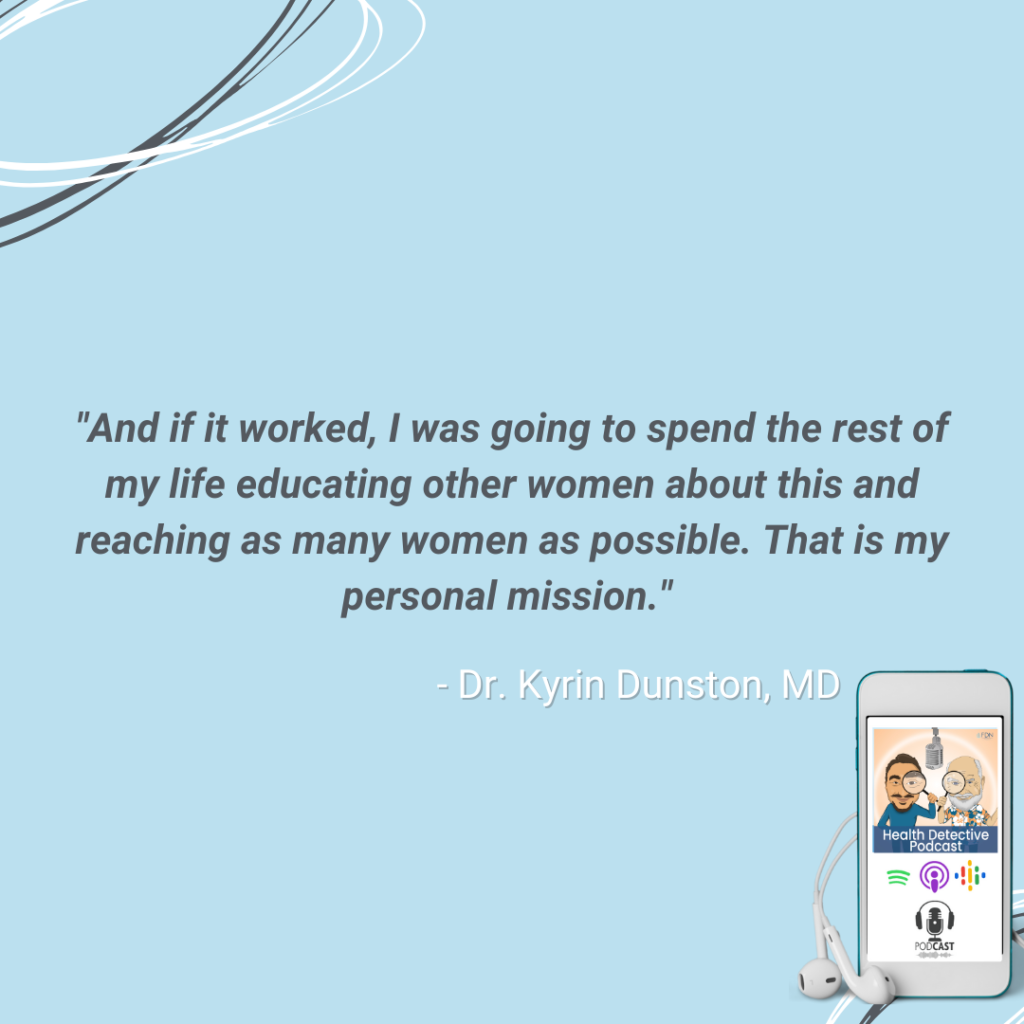
[00:38:49] Dr. Kyrin Dunston: I retired from OB/GYN in 2011, cause I made a pledge that when I discovered this, that I was going to use it on myself. And if it worked, I was going to spend the rest of my life educating other women about this and reaching as many women as possible. That is my personal mission.
I’ve done two summits, Stop the Menopause Madness Summits, which have been amazing. We had 75, or plus, experts. I think Reed was one of our experts, yep. Then I have two companies I’ve created to serve women. One is Midlife Metabolism Institute, where I do coaching and education programs for women, teaching about all the things they don’t need a prescription for. Then I have The Hormone Club. Here’s the link Hormone Club Membership (thehormoneclub.com). We actually have a special discount code (bliss10).
Mastering Hormones with Resources from Dr. Kyrin Dunston
So, The Hormone Club is a telemedicine solution that I created for women. After the last, Stop the Menopause Madness Summit, I kept saying women were reaching out to me from all over the world. I was like, we need a telemedicine solution for women to obtain the right tests, that could be read the right way, for them to get hormone therapy, have a telemedicine consult from the comfort of their home, and have hormones delivered to their home. One day I realized I was the one to create it. So, I did.
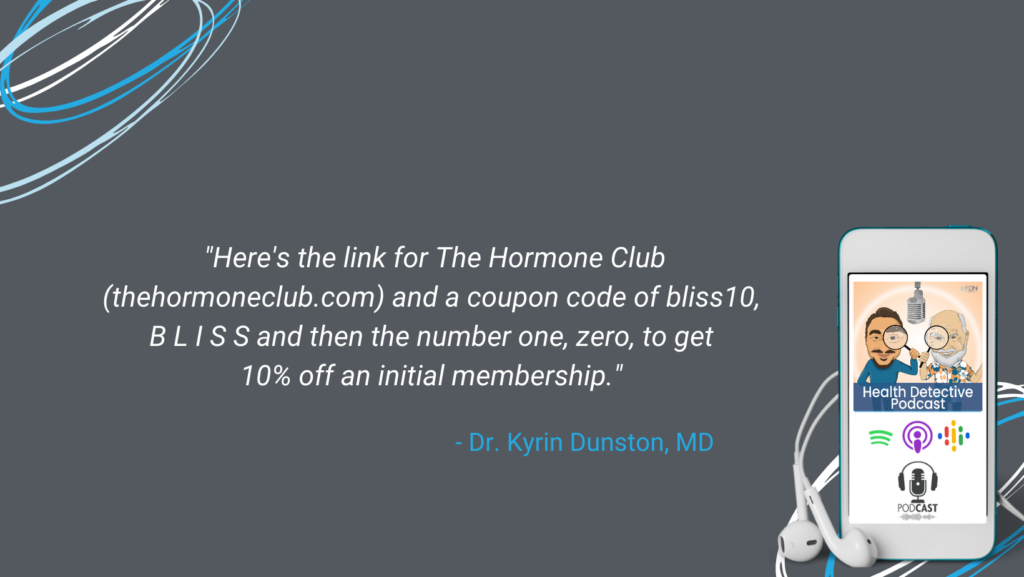
That’s The Hormone Club. In 47 states in the U.S., you can get that service. Here’s the link for The Hormone Club and a coupon code of bliss10, B L I S S and then the number one zero to get 10% off an initial membership.
Those are two resources I’ve created. I have the Hormone Prescription Podcast with a new episode every week, where I talk all about hormones. Like you name the symptom or the health problem, it relates to hormones. So that’s what I teach you in this podcast. I always say that I’m not going to give you a fish, I’m going to teach you how to fish, so you understand what is happening with your own health, so that you can navigate your health journey. Those are some resources I have.
[00:40:50] Detective Ev: Sweet. To be clear with the hormone comment, because obviously we’re still talking about downstream. You mean once the person feels the symptom that’s because of a hormone thing. But the hormone thing could be because of the million other things going on in this world. Correct?
Mastering Hormones by Focusing on the Hormone Problems
[00:41:02] Dr. Kyrin Dunston: Right. But you know, if you have an autoimmune disease, you have a hormone problem.
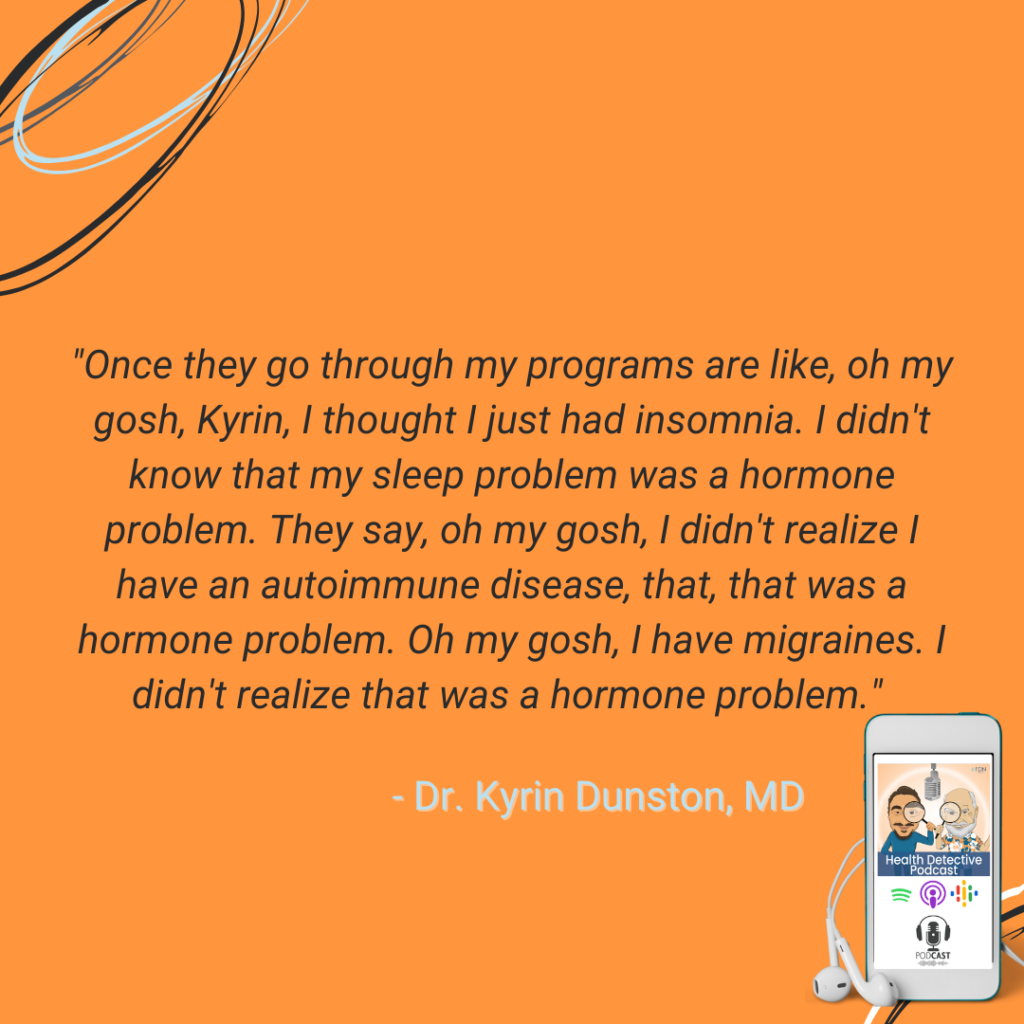
See, what I’m finding is that a lot of women don’t even think they have a hormone problem and they’re going to all these different doctors. In fact, they tell me this. Once they go through my programs are like, oh my gosh, Kyrin, I thought I just had insomnia. I didn’t know that my sleep problem was a hormone problem. They say, oh my gosh, I didn’t realize I have an autoimmune disease, that, that was a hormone problem. Oh my gosh, I have migraines. I didn’t realize that was a hormone problem.
Every single health diagnosis, you have, every single symptom you have is related to a hormone problem that you have. Nobody’s telling you this, but that’s what I teach you in that podcast is how to know.
[00:41:49] Detective Ev: Cool. Well, I always love listening to health podcasts, so I’m glad to have another one on my list. I think it’s always really important to think from like the client or patient perspective.
We have some kind of realistic timeframe here. You were doing a lot of right stuff. You’re clearly smart, so you’re studying probably fast as heck and applying probably as quick as one could. How long did it take to kind of get back to a state where you can come on to a podcast like this?
You don’t look like you lost a hundred pounds, right? You look good and you have high energy. You’re verbally fluent. How long does it take to get to somewhere like that?
Mastering Hormones with the Right Tests & Reading Them the Right Way
[00:42:17] Dr. Kyrin Dunston: I mean, you know, it took me two years to lose a hundred pounds. Which I think is a pretty good rate if you’re really diligent about addressing all the things that’s healthy. And I’ve kept it off since. The thing is when you fix the reason why you have the weight problem, the fibromyalgia, the chronic fatigue, all of these things, it happens organically and naturally at the rate which the body wants to fix it.
We’re born with this incredible system that wants to heal itself. You cut your hand, you don’t have to do anything except protect it from danger with a band aid and it will heal itself. Well, your whole body is that way. What we don’t realize is that most of us are every day doing things in our lifestyle that’s throwing fuel on the fire and causing our body to be more and more unbalanced.
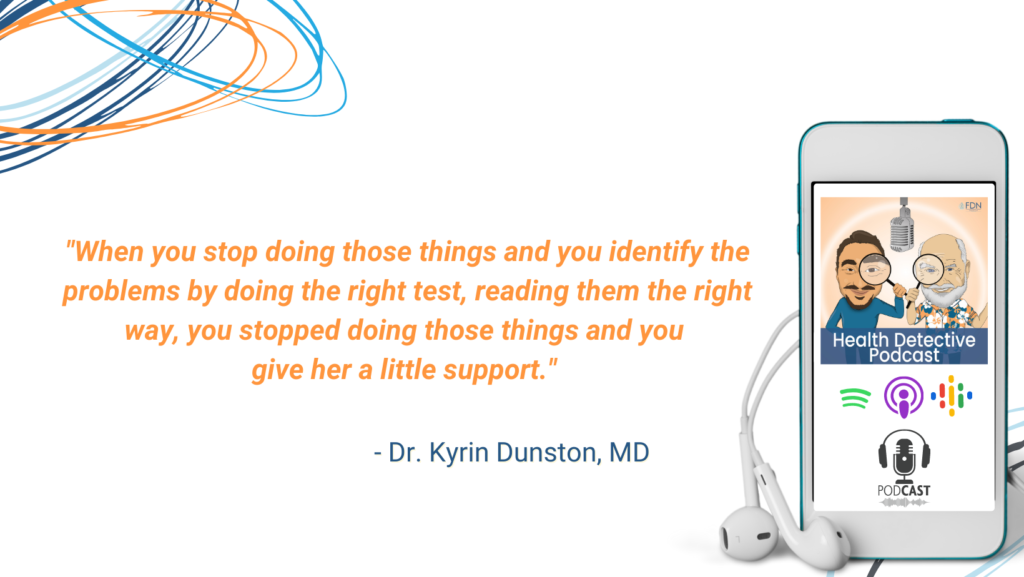
When you stop doing those things and you identify the problems by doing the right test, reading them the right way, you stopped doing those things and you give her a little support. I had one patient who described it as like, she felt like she was circling the drain. Every day she got up, she said it was another new symptom.
What’s it going to be today? Instead of circling the drain and going down, you start unwinding the spiral and going up and getting better. So, like in my Midlife Metabolism Institute, the first program is the Midlife Metabolism Rescue. It’s three months and within that three months, I have people lose 10 pounds, sleep all night, and go, Kyrin, I haven’t been able to lose a pound in 20 years and now I lost 10.
Start Mastering Hormones by Asking Questions
It happens pretty rapidly, you’d be surprised. People are like, oh, fast weight loss is not healthy. Well, it’s not healthy to go in and staple your stomach and cut half of it out. It’s so funny because people are like, oh, that’s so radical. You want me to pay, you know, $500 a test for these tests and do these supplements. That’s so radical, Kyrin.

I’m like, you think that’s radical, but you don’t think it’s radical to get your stomach cut open and half your stomach’s stapled or cut out? Our whole perspective of what we’re socialized in is so skewed. It’s time we started questioning everything.
Back to your original question. It happens organically pretty rapidly that people’s health straightens up.
[00:44:35] Detective Ev: Well, I think it’s still good though, because you paint the picture that, hey guys, this takes time. Like, it takes some amount of time. It’s not a pill that you take one day and the next day everything’s fine. And it’s supposed to. It took time to get sick.
Now, thankfully, we are so blessed in that the body that we have, somehow, even if we do 10, 20, 30 years’ worth of damage (I know this because I’ve interviewed tons of people, I’ve experienced it myself), somehow can still turn it around if you’re doing the right things, 10 times, maybe even 50 times in certain people, quicker than it took you to actually get to where you’re at. It’s amazing. It’s not like a good thing, but the body’s obviously number one job is to survive and reproduce.
Amazingly Surviving at Suboptimal States
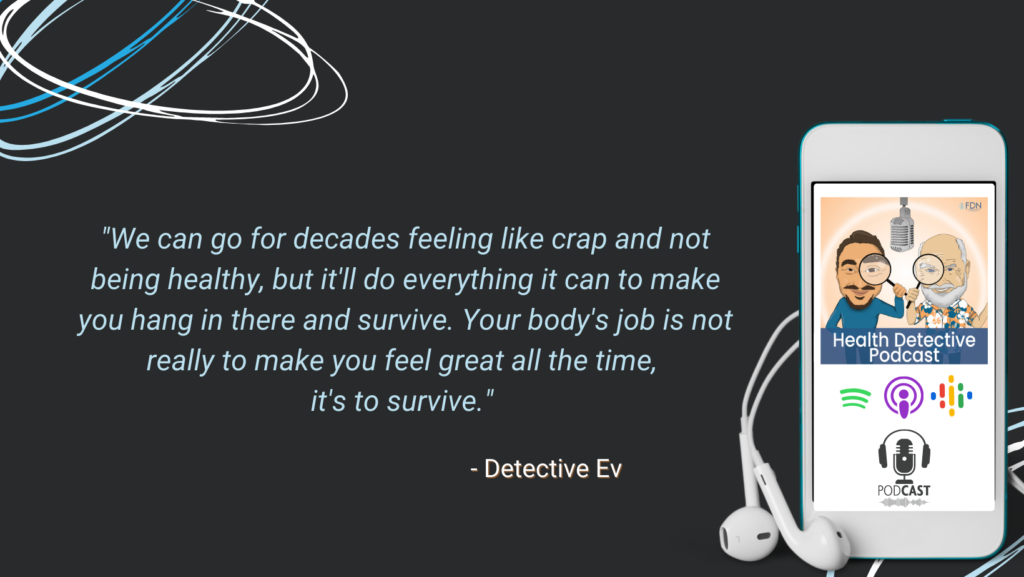
I always find it really interesting how long a human being, even without Western intervention, can survive at a suboptimal state. We can go for decades feeling like crap and not being healthy, but it’ll do everything it can to make you hang in there and survive. Your body’s job is not really to make you feel great all the time, it’s to survive.
We gotta be intelligent with what we’re doing if we want to have that vibrant health and do all those things. I think that’s really cool. I think it’s just inspiring when other people are out here doing this that are our doctors, and it’s just so much more credible. I want to finish up today with two more things.
Obviously, people know where they can find you and we have that in the show notes. But one of the things I want to ask, because you’ve worked with so many people, are there any like really special client testimonials that stick out to you? Stories of people that have just gone through the ringer. Like you had no idea what was happening and then they finally came to work with someone like you and that was a really transformative experience for them.
Mastering Hormones Client Success Story
[00:45:58] Dr. Kyrin Dunston: Oh my gosh, yes. There are a lot, but one woman comes to mind. It was early on when I started doing this with patients. She and I had the same internist in my town. This was the same internist who had supported me in checking my thyroid at least 10 times. The last time when I went to her, I said, something’s gotta be wrong.
She said, well, I’m going to run this test one more time, but it’s the last time. Then she made me come to her office to get the results. I’ll never forget it. She yelled at me and she’s like, your test is normal, there’s nothing wrong. You just need to eat less and exercise more. She yelled at me. I ran to my car, and I started crying.
So, this woman had the same internal medicine doctor as I did. She had diabetes, high blood pressure, and high cholesterol, which I call the American trilogy. She was on medications for all of those, I think a total of five medications. She heard about what I was doing and the transformation I had had, so she came over to see me.
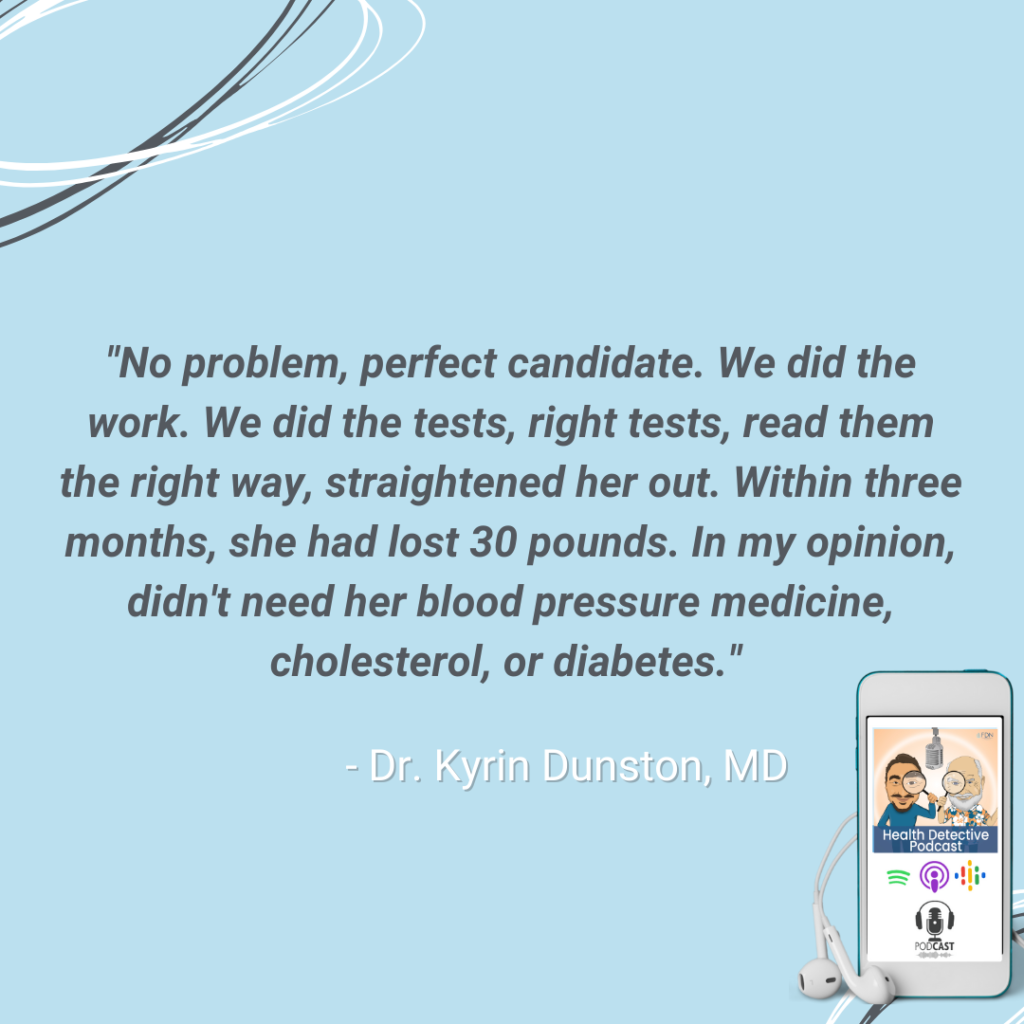
No problem, perfect candidate. We did the work. We did the tests, right tests, read them the right way, straightened her out. Within three months, she had lost 30 pounds. In my opinion, didn’t need her blood pressure medicine, cholesterol, or diabetes. But I always tell people, you go to your primary care who prescribes those, and you let them tell you that.
Shocking Example of the Deep Paradigm
She went over to the woman’s office and said, oh my gosh, I’ve been working with Dr. Kyrin, and I’ve lost 30 pounds. She doesn’t think I need these medications. Do you think I need them? The woman said, no, you don’t need them anymore. You can come off them.
She said, well, what have you been doing? She had this whole binder with all these labs in it. She had all these notes and all these supplements she’s taken. She’s like, look. She was so excited. To your point, how do you talk to doctors about this? She was so excited, Evan. Then she’s like, look at everything we did. The woman literally said to her, I don’t know why you’re wasting your time and your money doing any of that. It’s a bunch of nonsense.
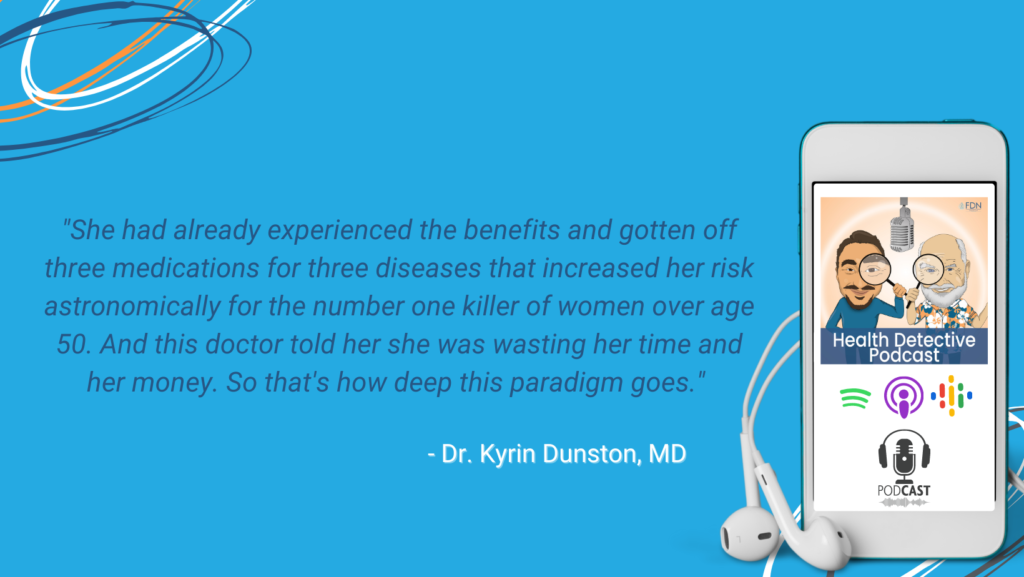
She had already experienced the benefits and gotten off three medications for three diseases that increased her risk astronomically for the number one killer of women over age 50. And this doctor told her she was wasting her time and her money. So that’s how deep this paradigm goes.
If that proof looking you in the face doesn’t say something, anyone else is hopeless to talk any sense. I, since then, put a warning with all the work that I do with people. Show this to your doctor at your own risk.
She literally drove across town in her car in tears to my office. I heard this commotion at the front desk that someone was crying. Came running up. Who’s crying? What’s happening? She’s like, I went over to her office, and I showed her. She told me it was a waste. I was like, oh, I’m so sorry. So, I put this warning, like I tell everyone.
It’s Not Normal. It’s Not Our Birthright.
Our healthcare is like this gap, particularly for women, men too. You guys are suffering too. I get it. But particularly women. We cycle, like we got so many moving parts. More moving parts, more potential for problems.
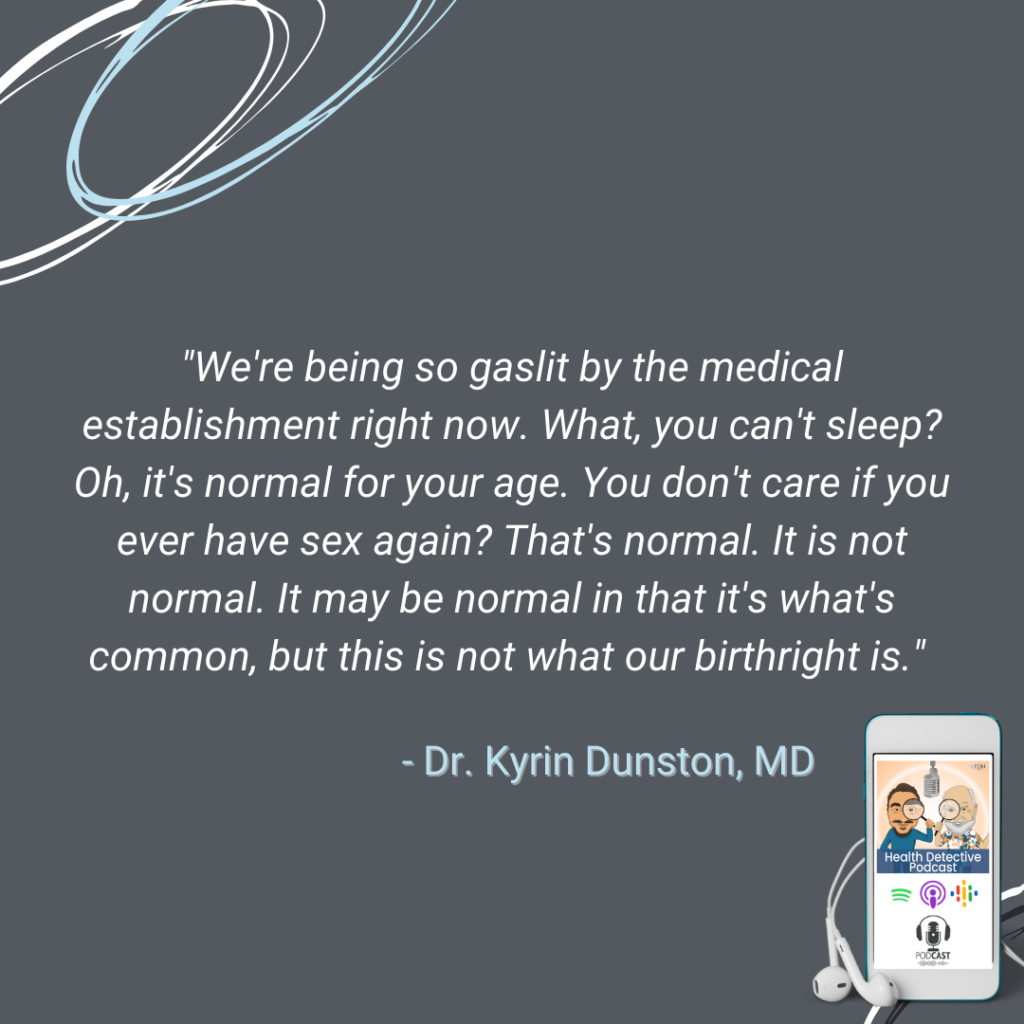
We’re being so gaslit by the medical establishment right now. What, you can’t sleep? Oh, it’s normal for your age. You don’t care if you ever have sex again? That’s normal. It is not normal. It may be normal in that it’s what’s common, but this is not what our birthright is.
We have a birthright to be a healthy weight. 60% of us are overweight or obese by the time we’re 50. By the time we’re 60, it’s three out of four of us. That is not okay. And a big part of it is the things we’re talking about. So, I know I’m on a little bit of a rant. It’s cause I’m so passionate.
[00:49:40] Detective Ev: I love this, all good.
[00:49:42] Dr. Kyrin Dunston: So, I’ll stop. But that would be the example I would share with you.
The Smarter You Are, The Harder to Hear Others
[00:49:49] Detective Ev: I’m glad it worked out for her, with you. That is scary how deep that goes. That’s just dogmatic at that point. I mean, if you could look at someone who objectively, already got the results and still deny it. Wow! You know, I’ve seen it before, and I’m not just talking the medical space.
It is kind of interesting. You could be very intelligent in like an IQ sense. I love psychology and I somehow got down that route at one point. I love studying that. It does not mean you have the capability to think outside the box or even have your thinking challenged necessarily. I think there’s a correlation.
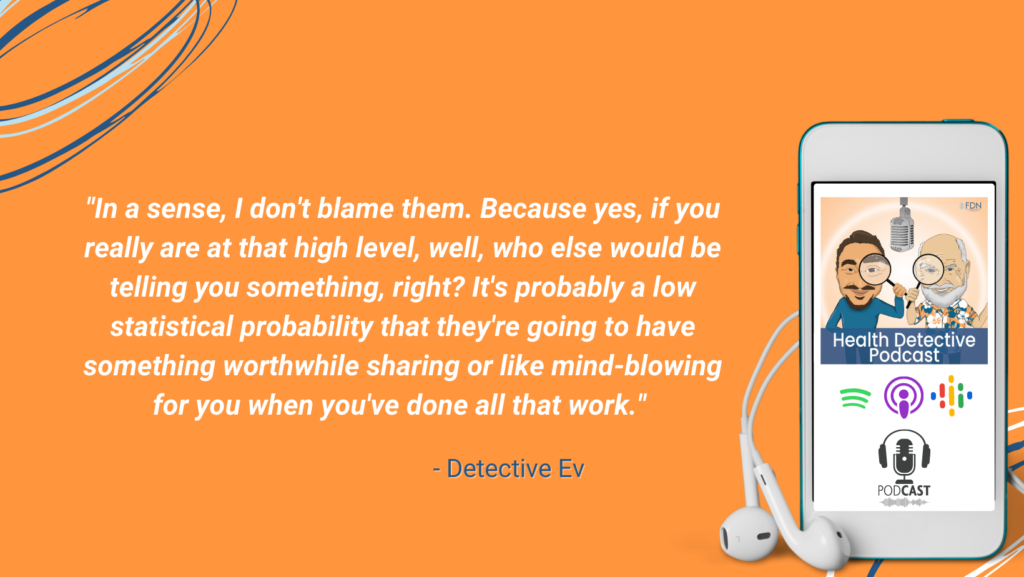
I think some of the most brilliant minds of all time had that ability, but it’s like weird. Sometimes it’s like it’s a curse. Because like you said, in the beginning, these people are so smart and they’ve been educated in that way, that that could actually be their biggest downfall. In a sense, I don’t blame them. Because yes, if you really are at that high level, well, who else would be telling you something, right? It’s probably a low statistical probability that they’re going to have something worthwhile sharing or like mind-blowing for you when you’ve done all that work.
But the truth of the matter is, yeah, there’s some crappy stuff going on. It is the system itself and we need a combination of these two systems. We need a merging. As you talked about before, the dollar’s kind of the main thing here.
Make It a Healthcare System First
Until the tops of these systems stop focusing just completely on that and stop treating people like a bunch of just factory workers still, yeah, I think we’re going to be stuck in this. But if we really can switch that mindset around and create a true system of healthcare, because it is not a healthcare system right now.

I love people arguing politically on both sides. It should be free. It shouldn’t be free. I’m like, how about we make it a healthcare system first? Then we can figure out what would work with that. Because you’re right, they’re like, well, this option doesn’t work. The free stuff doesn’t work. The paid stuff doesn’t work. It doesn’t work because it’s not even the right system. No, it doesn’t work either way. We needed to actually do something that it says it’s going to do.
You can get me off on these tangents pretty easily as well. I feel like you and I could go forever. If you guys want Dr. Kyrin on for a part 2, let me know. Drop it in our comments or the reviews. Because I’d have you back on anytime. I think this would be amazing.
Health Detective Podcast Signature Question
I do for the sake of time though; I want to finish up with our signature question on the Health Detective Podcast. I have no idea where this is going to go with you. I’m curious about this one.
The signature question is, if I could give Dr Kyrin in this case, a magic wand where you could get every single person in this world to do one thing for their health, whether that’s literally do one thing or stop doing one thing, what’s the one thing you’d get them to do.
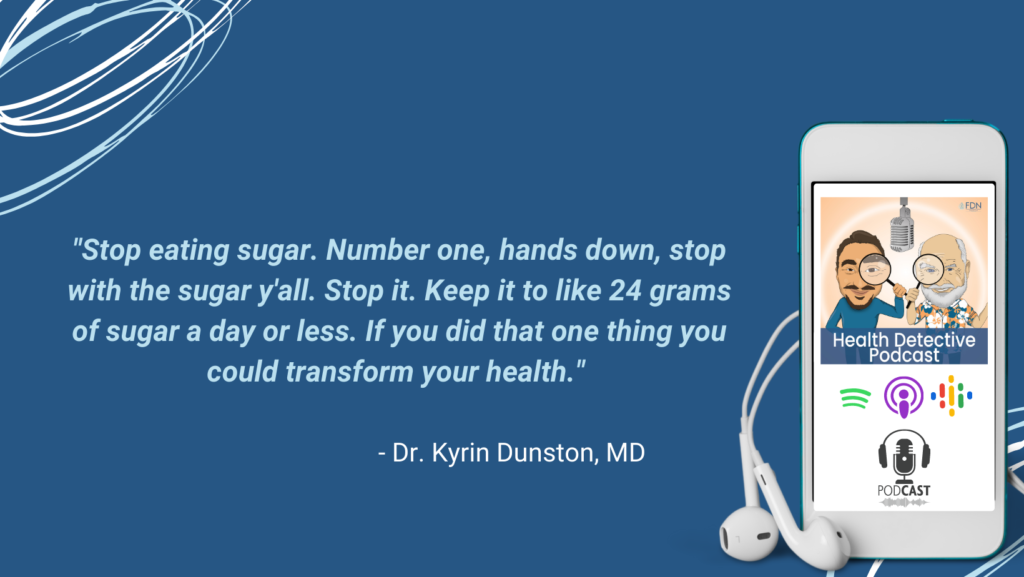
[00:52:06] Dr. Kyrin Dunston: Stop eating sugar. Number one, hands down, stop with the sugar y’all. Stop it. Keep it to like 24 grams of sugar a day or less. If you did that one thing you could transform your health. Even what we call the standard American diet, the SAD diet is full of sugar. It’s appalling.
So, everybody’s familiar with the Super Size Me movie with Morgan Spurlock who ate obviously unhealthy food and totally derailed his health in two months. But not everyone’s familiar with the movie called That Sugar Film by Damon Gameau, who’s an Australian filmmaker, who ate quote/unquote “healthy food” that most Americans think is healthy – granola bars, yogurt, smoothies. He completely derailed his health in two months.
Stop with the sugar.
Conclusion

[00:53:02] Detective Ev: Well, that’ll do it for today’s episode with Dr. Kyrin Dunston. I think you guys know what I was talking about in the beginning now, right? I mean, if that woman doesn’t fire you up, you must not be listening. She just gets me going, man. I’m ready to get healthy. I’m ready to help other people. I’m ready to podcast, that’s for sure.
And hey, if you’re ready to do that as well, you already know, I shouted this out in the middle of the podcast today, check out fdntraining.com/tryfdn and that’s where you can try the FDN course completely for free.
You do not have to go to an additional four years of schooling to go do meaningful work in the functional space. That’s what FDN was created for. It is basically a pretty intense course. But it’s for anyone and everyone with the will to actually do this.
You can see if it’s actually for you now, by going to fdntraining.com/tryfdn. I think I mentioned this too, before. There’s no credit card required, guys. It’s nothing like that. We know that there are plenty of people out there who want to do this. So thankfully, in our world you don’t need gimmicks and BS to get people to come and do this. So, check that out.
I want to thank you guys for listening to yet another episode of the Health Detective Podcast. If you like what we’re talking about and are feeling extra kind today, please leave us a five-star review on Apple and or Spotify. If you did that, I would love ya even more than I already do.
I’m looking forward to talking to you guys again soon, but until that time, take care.

